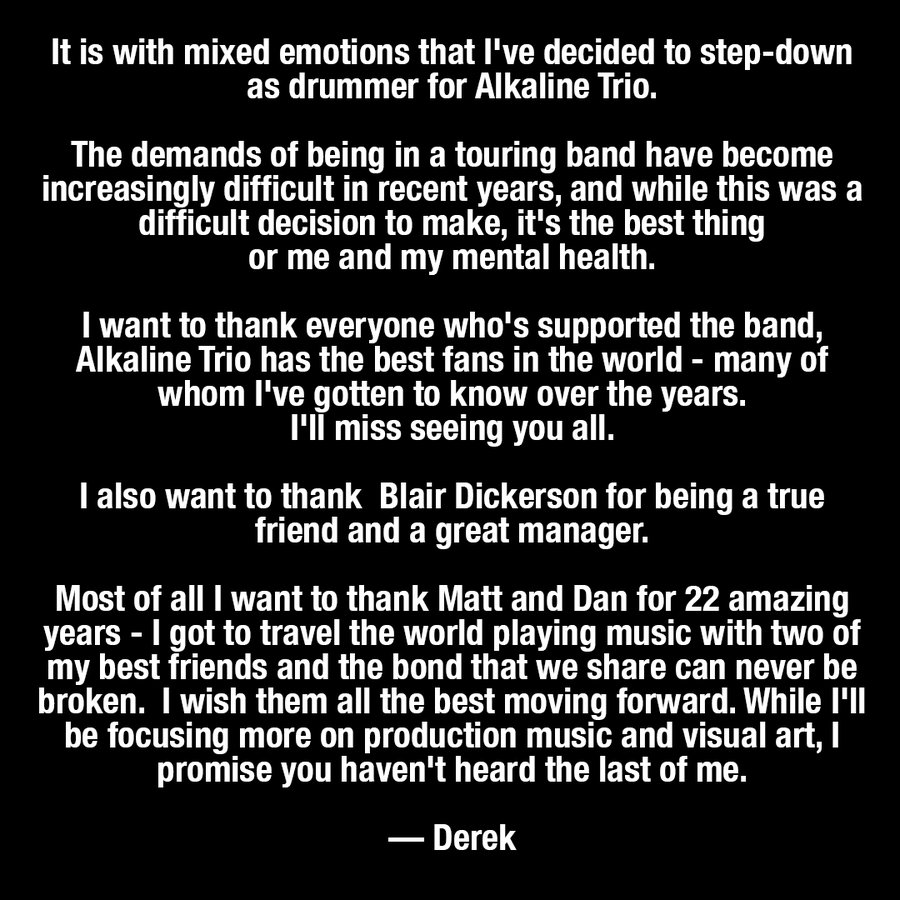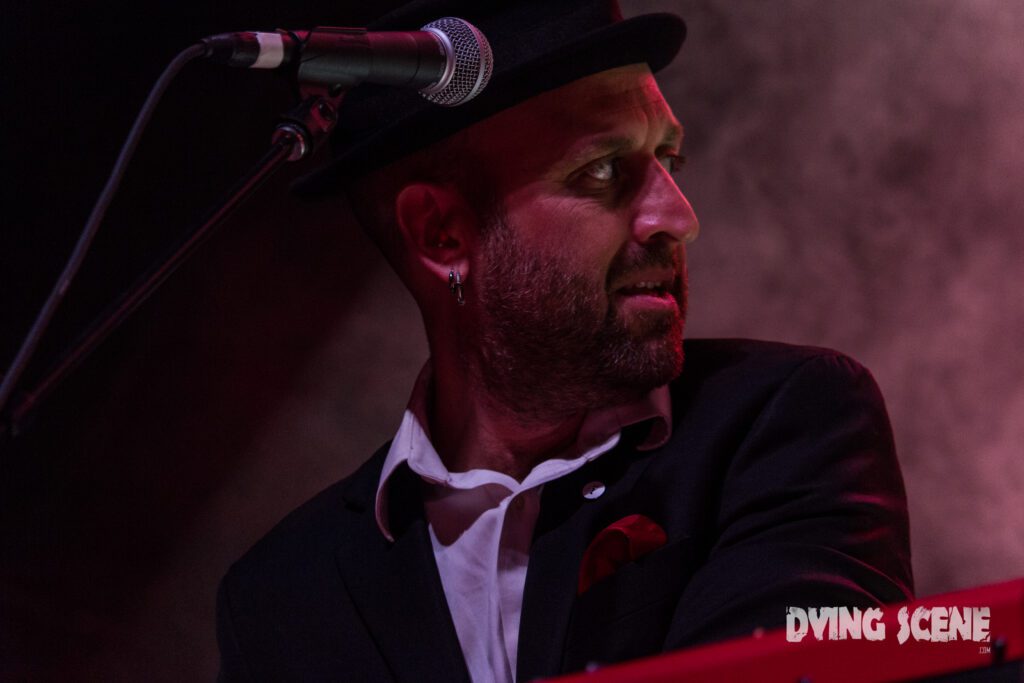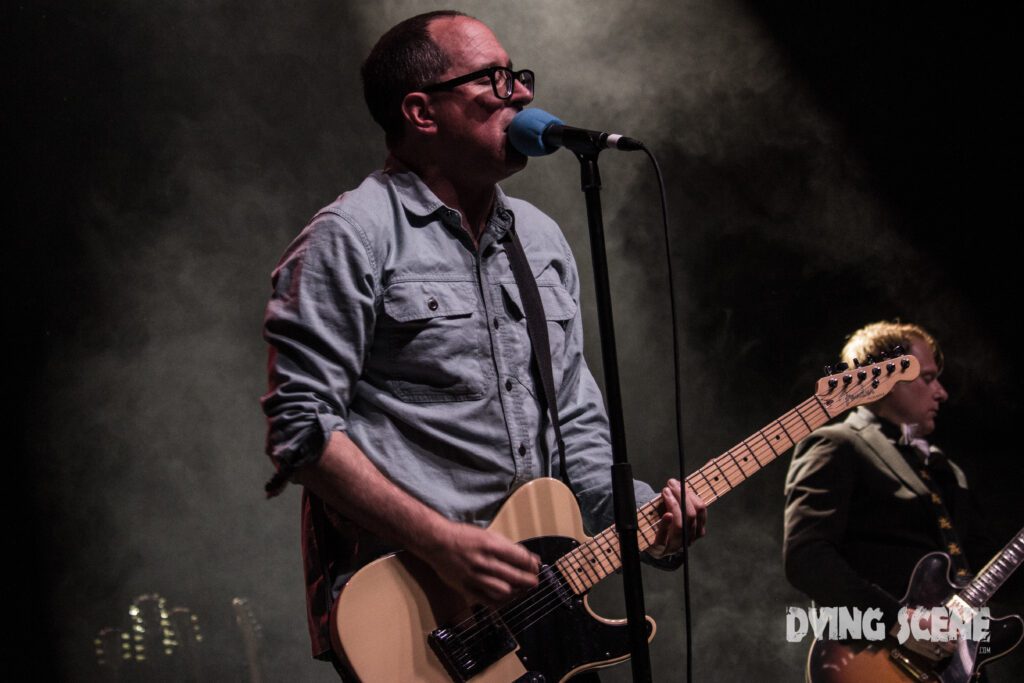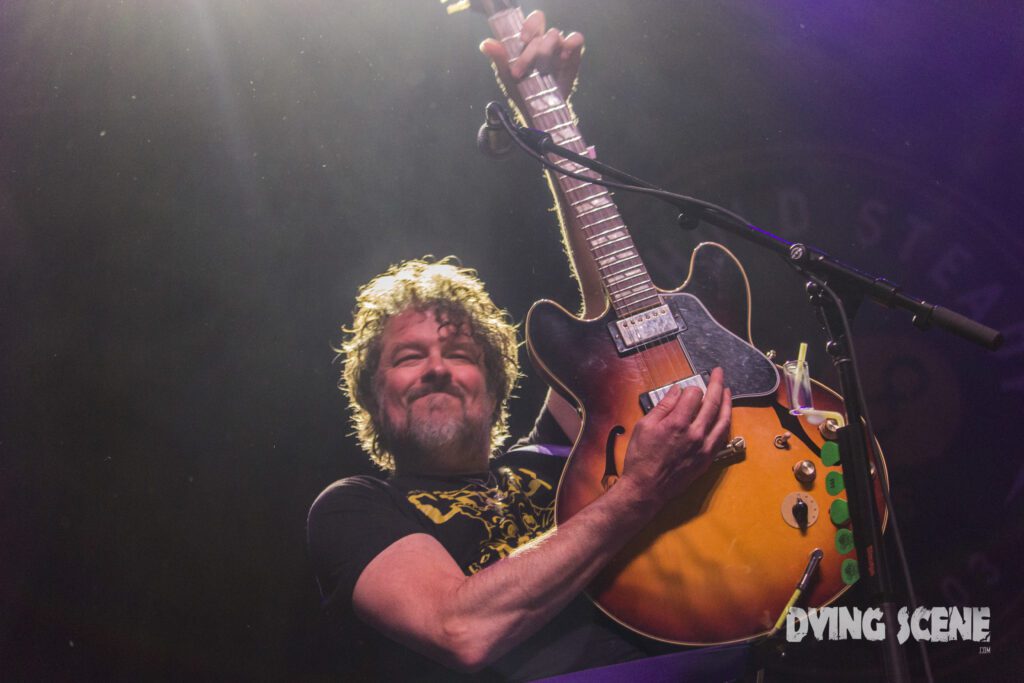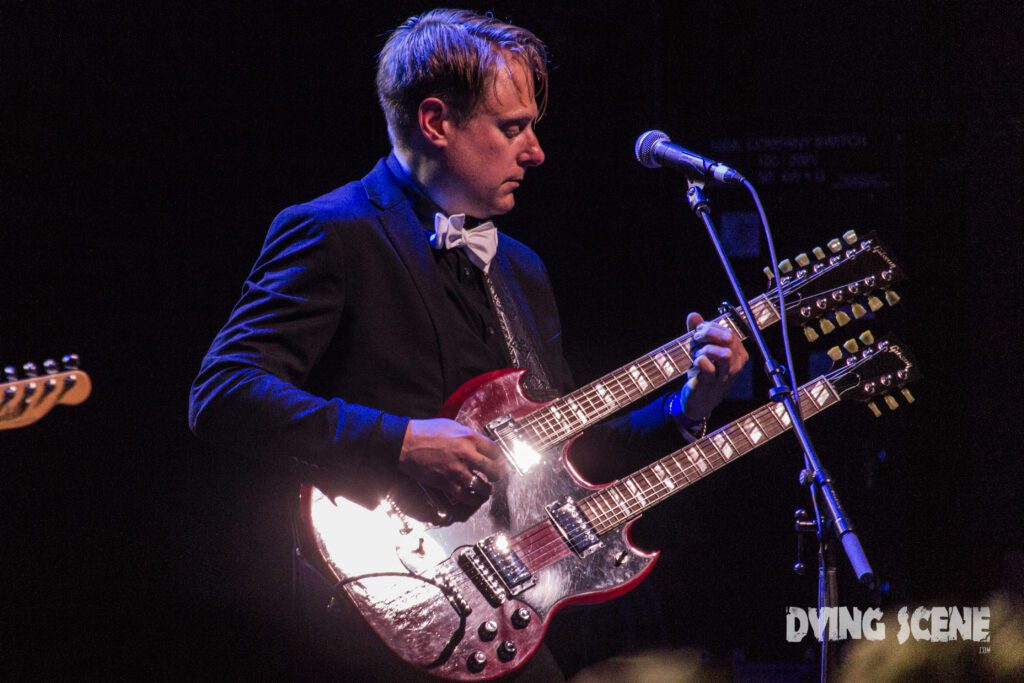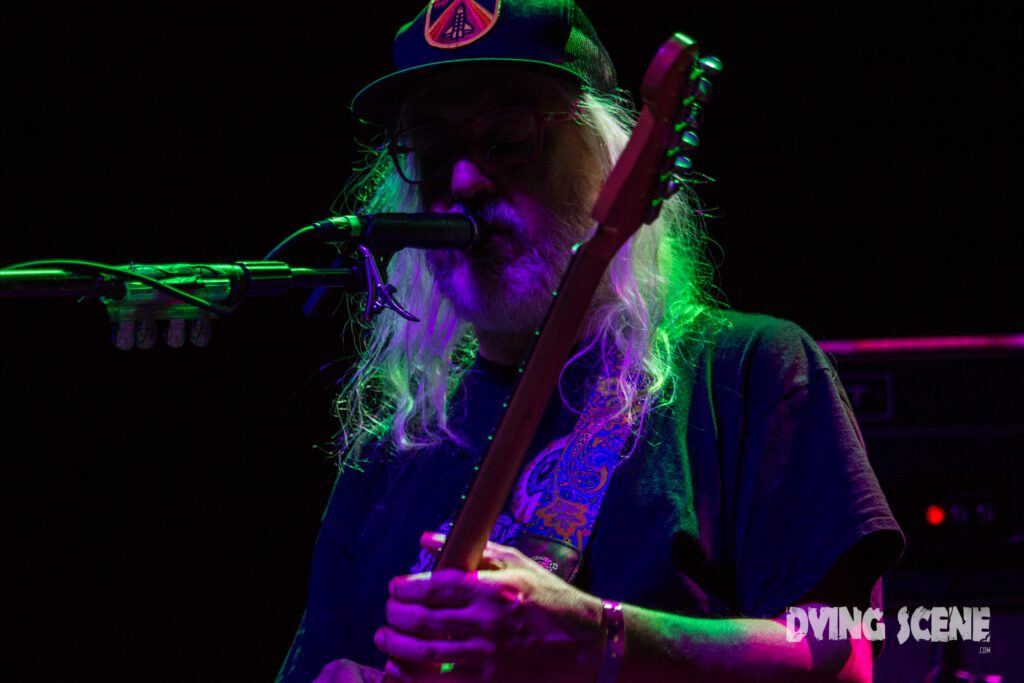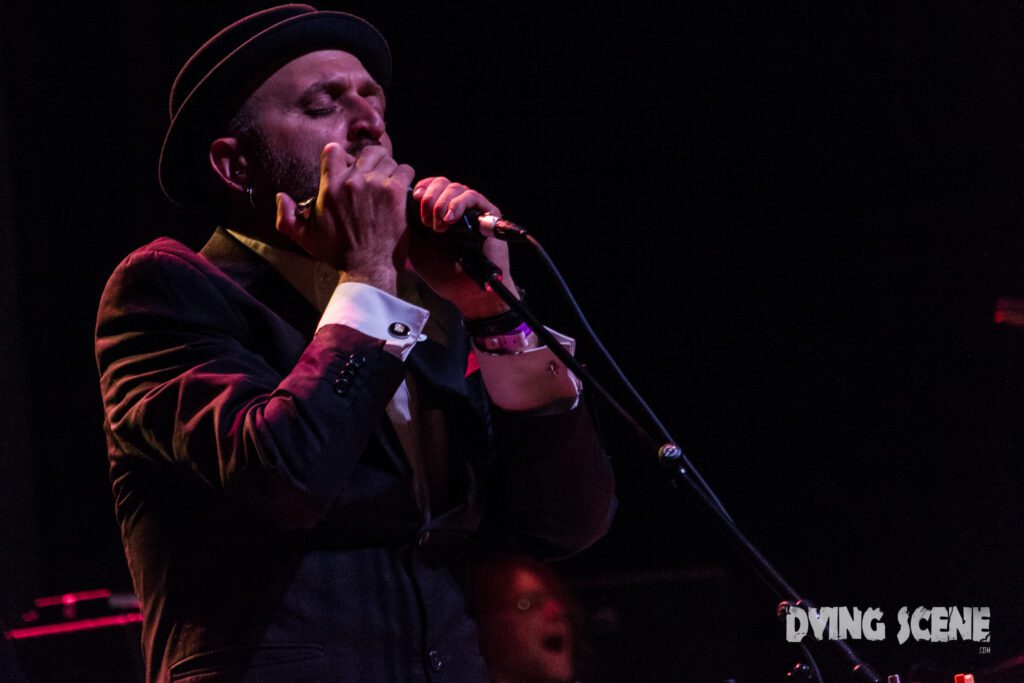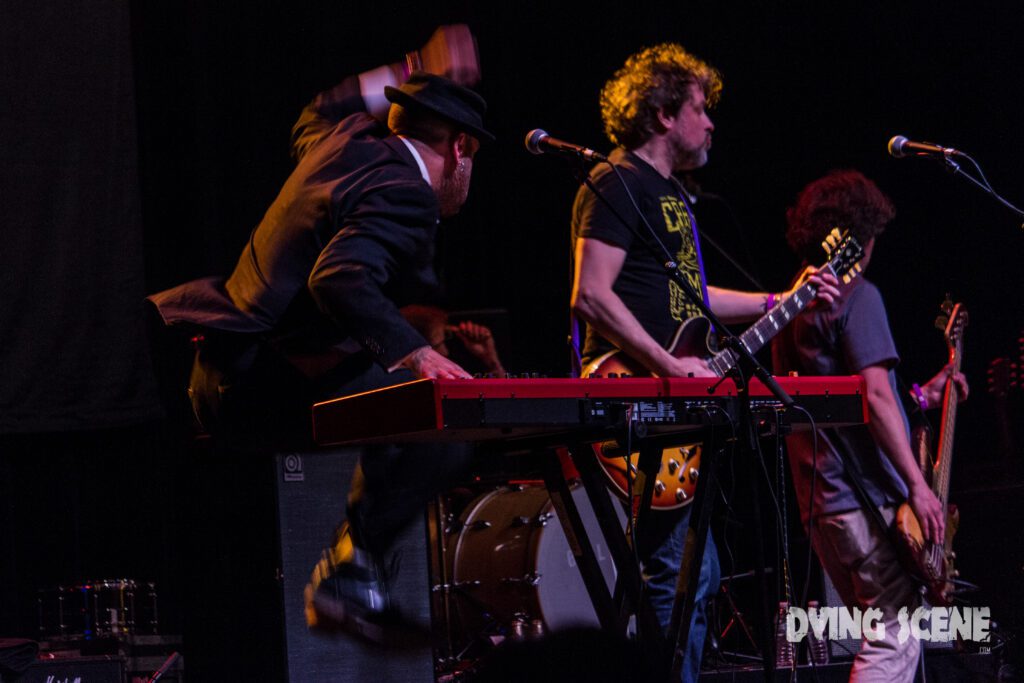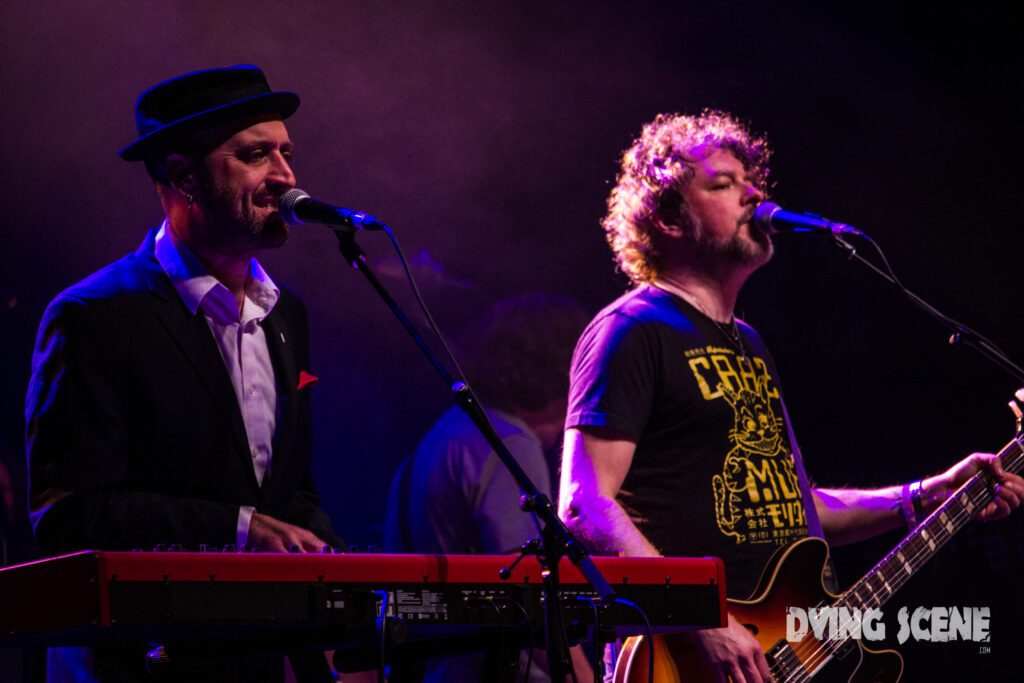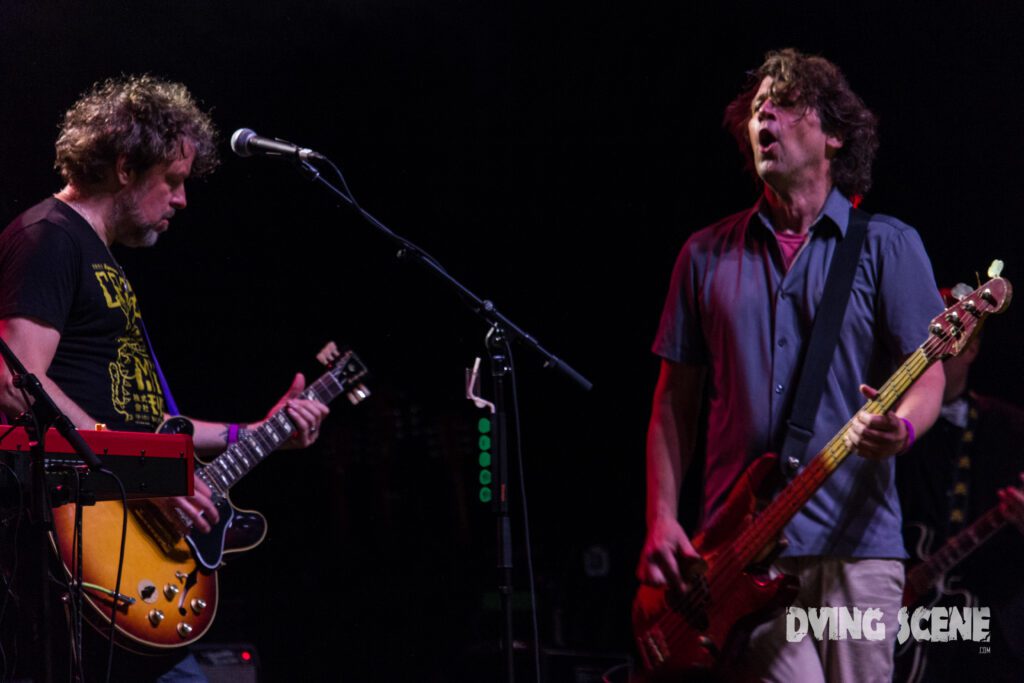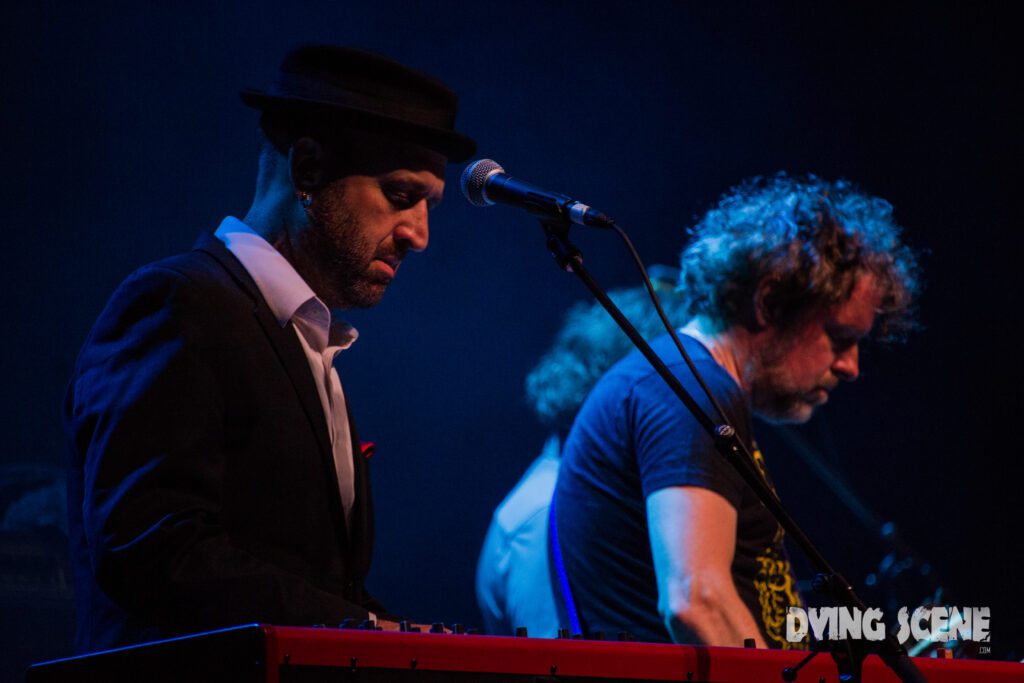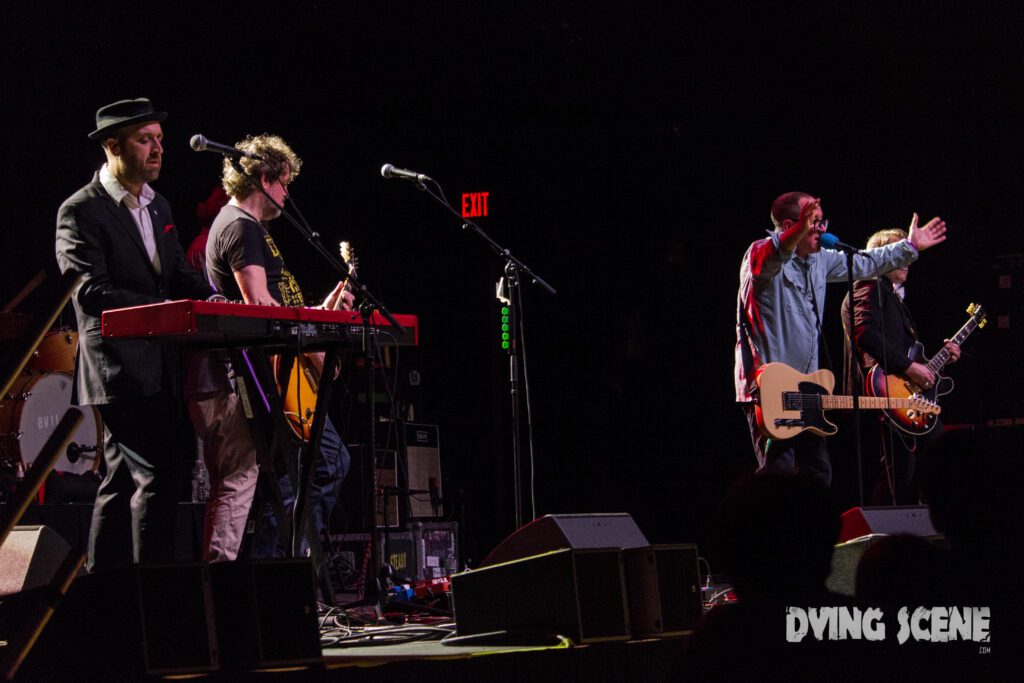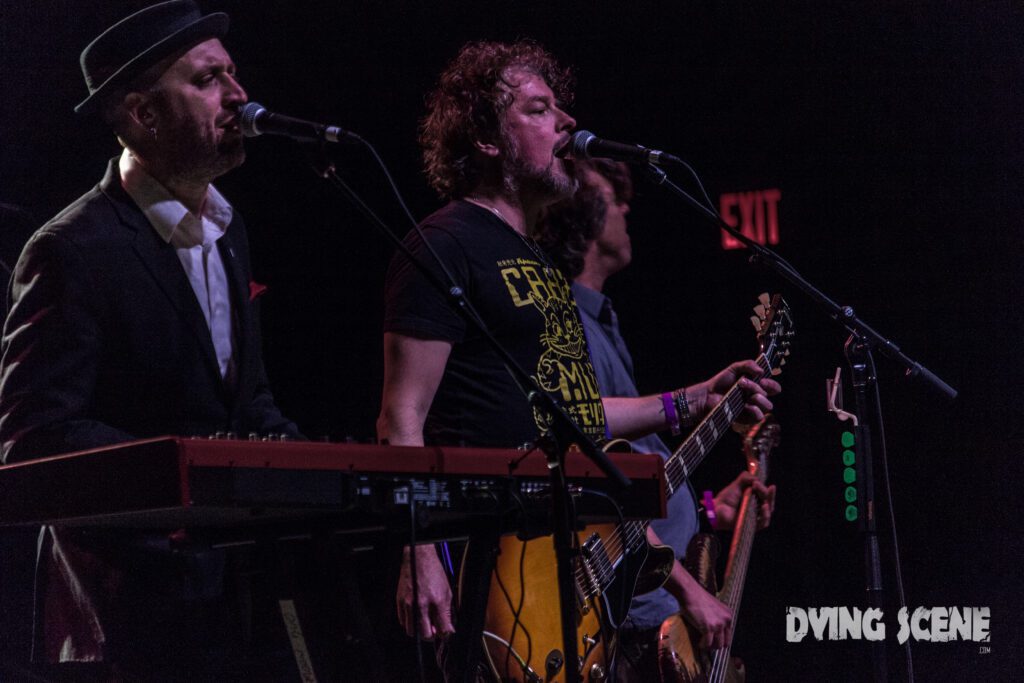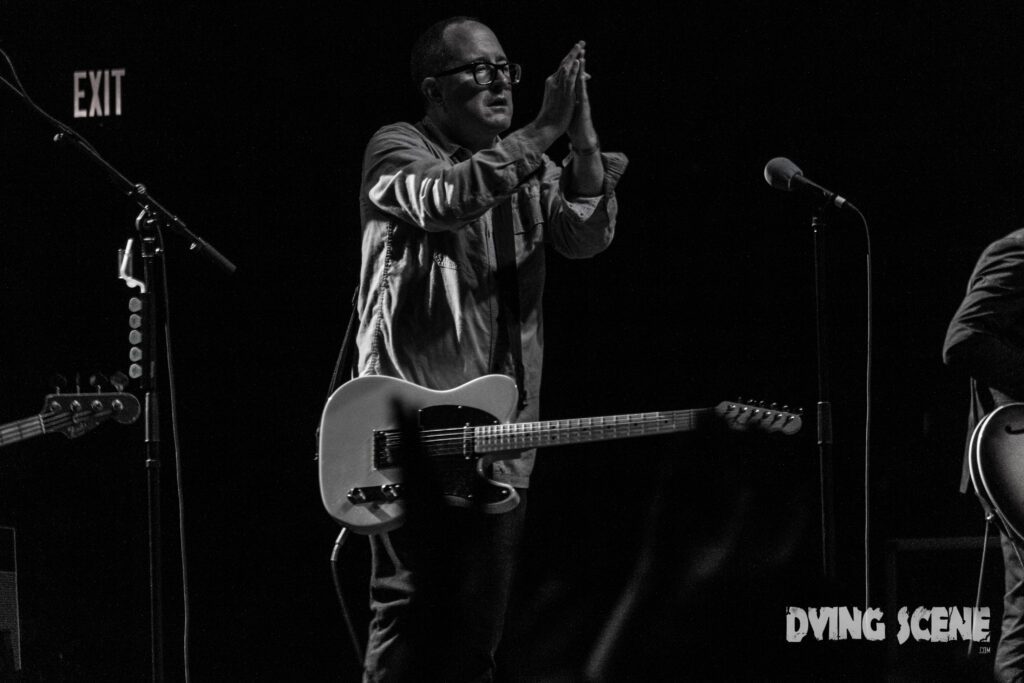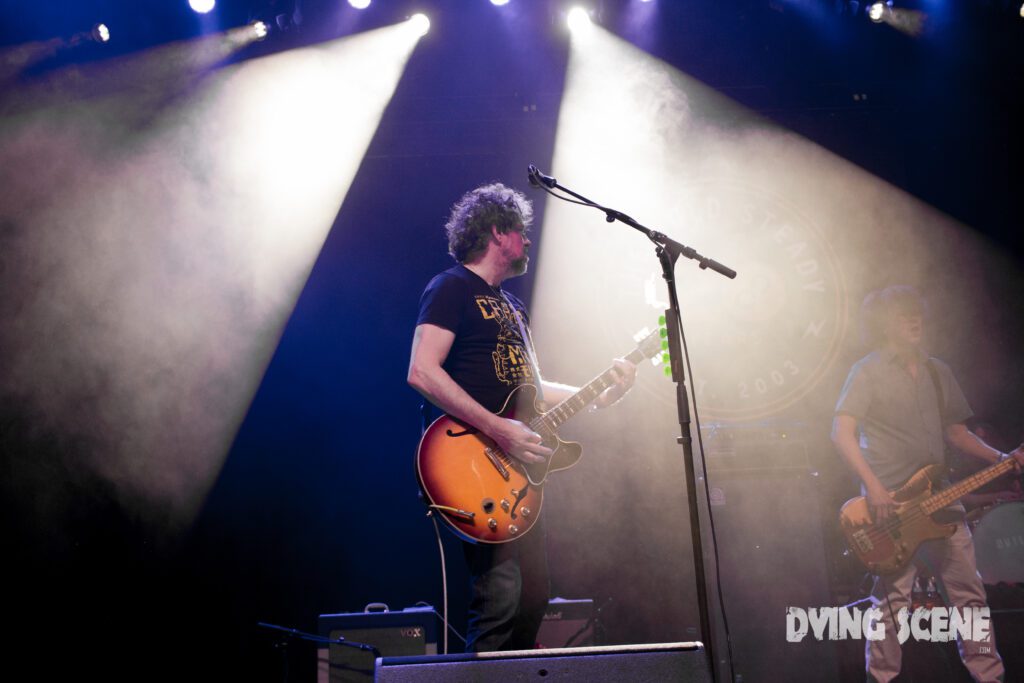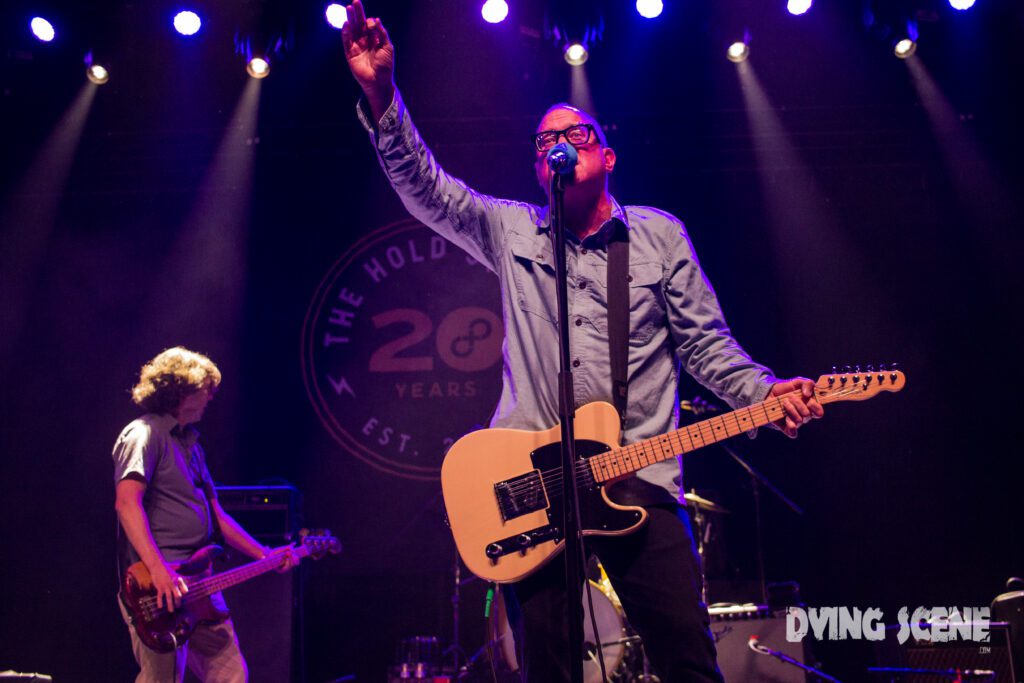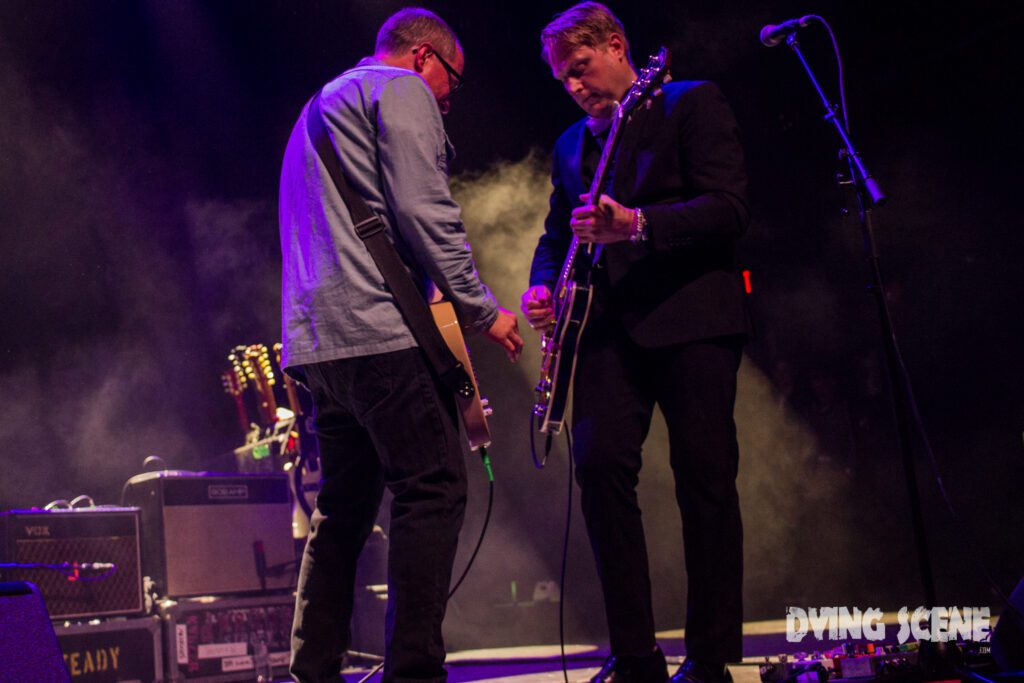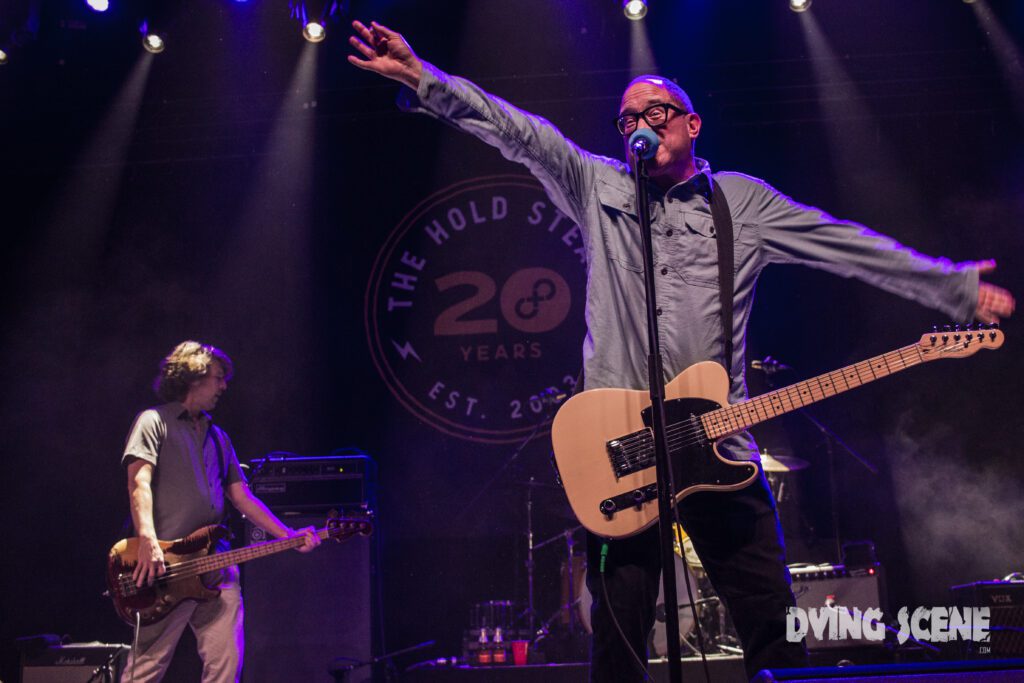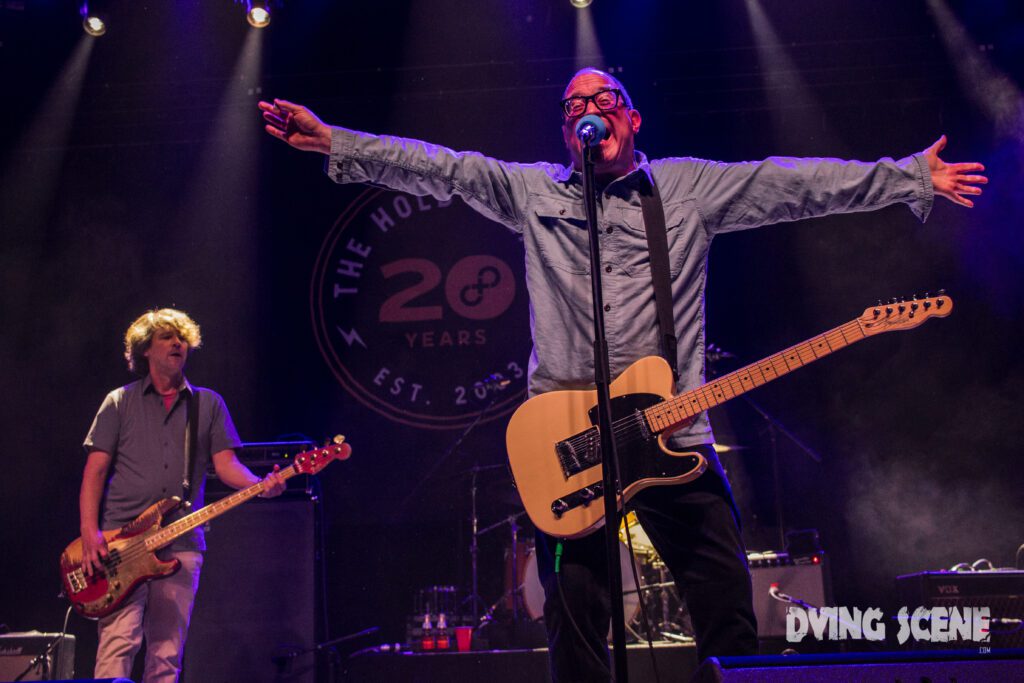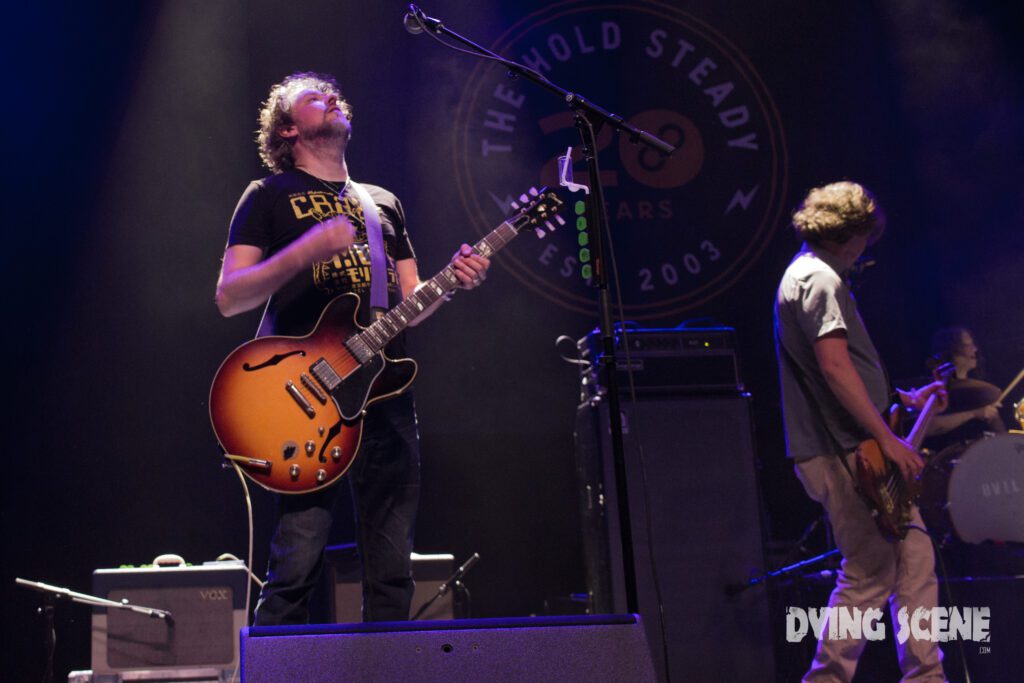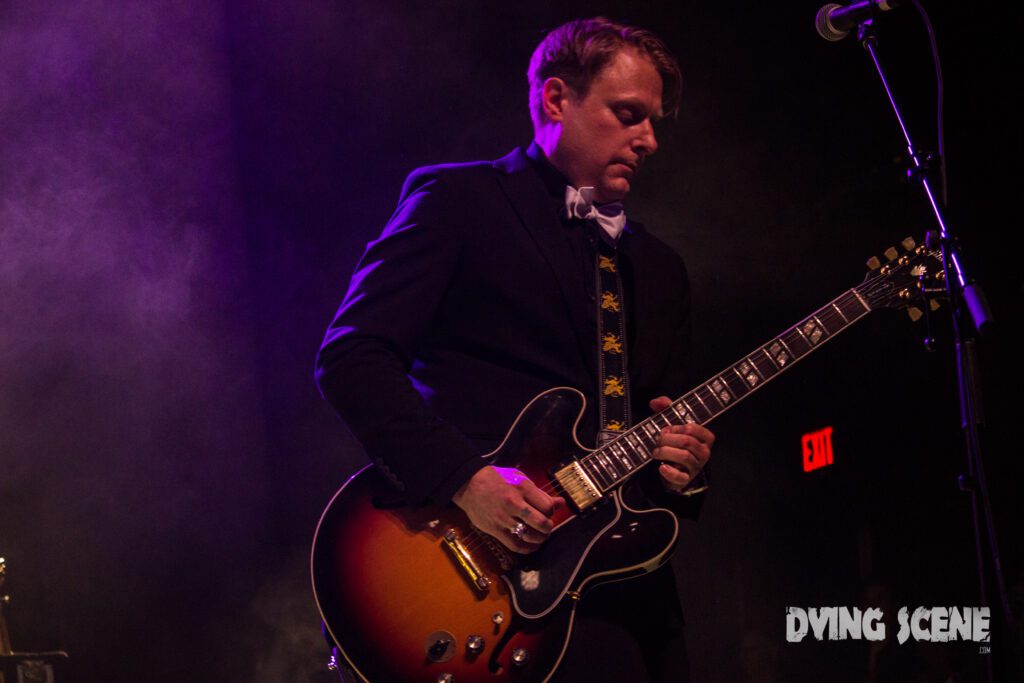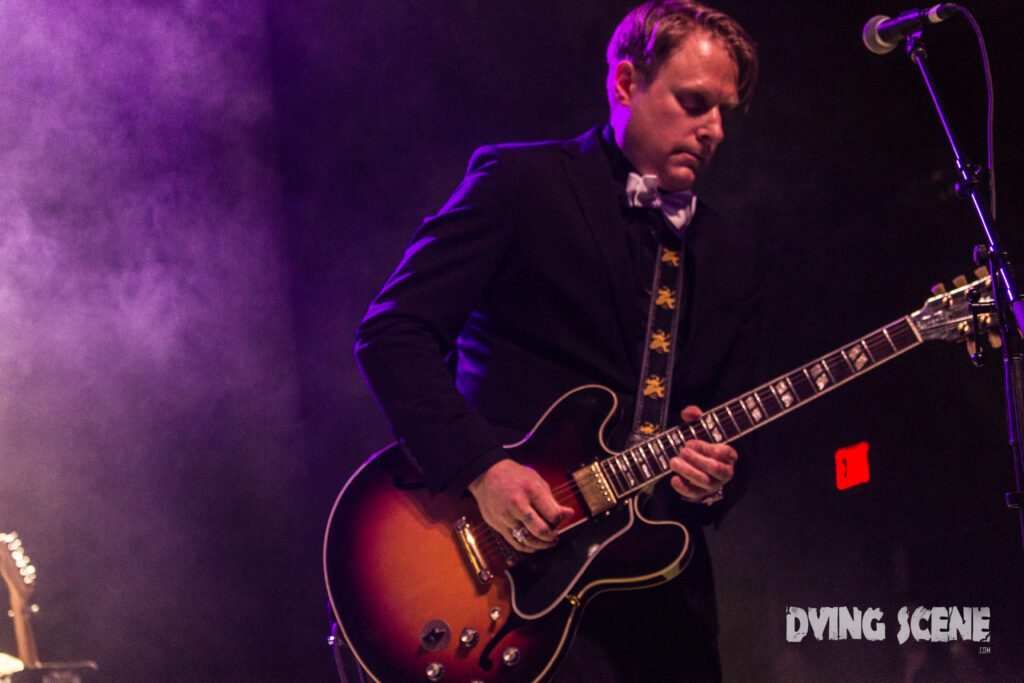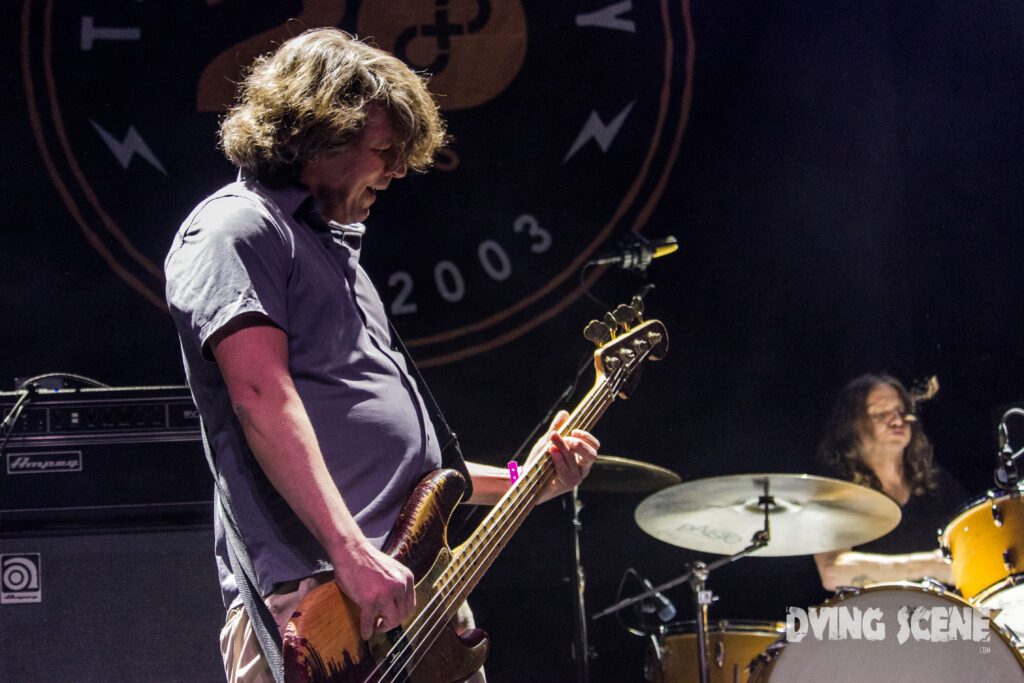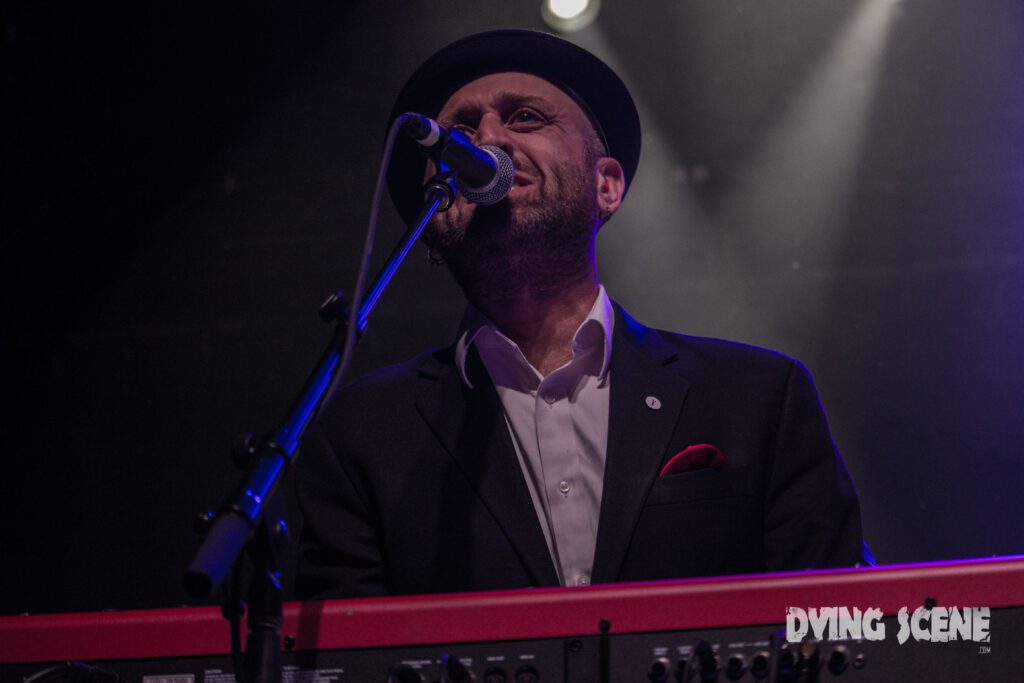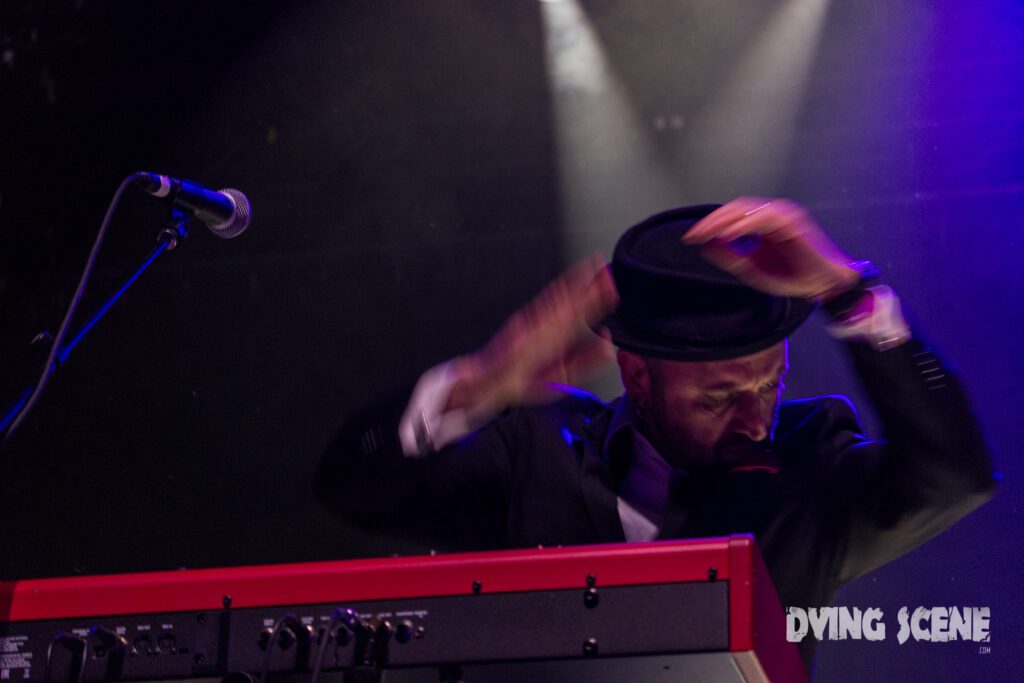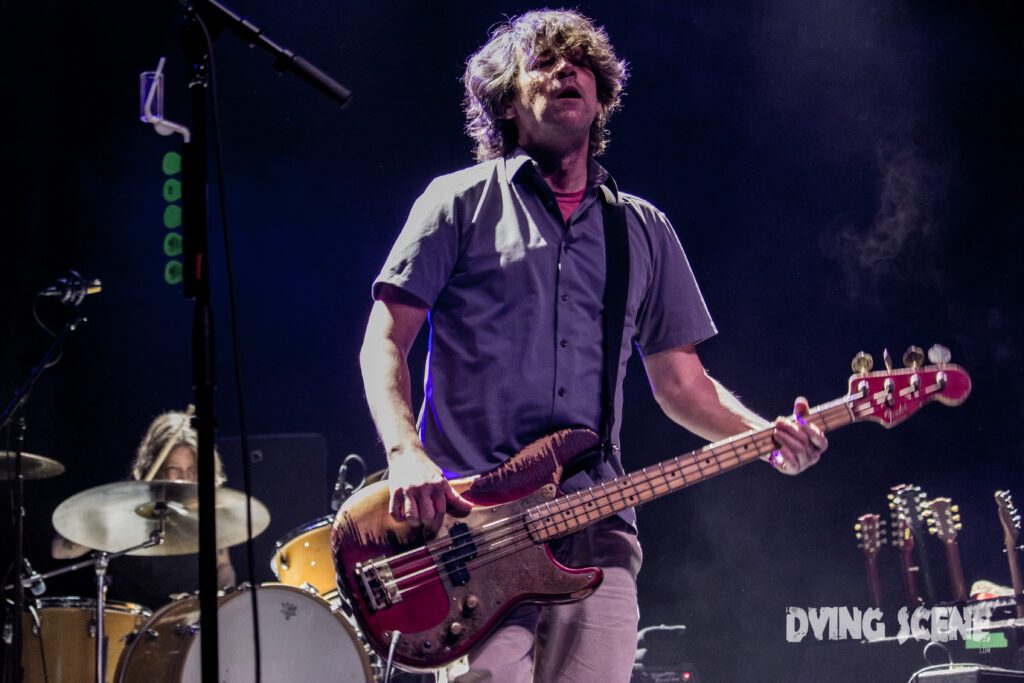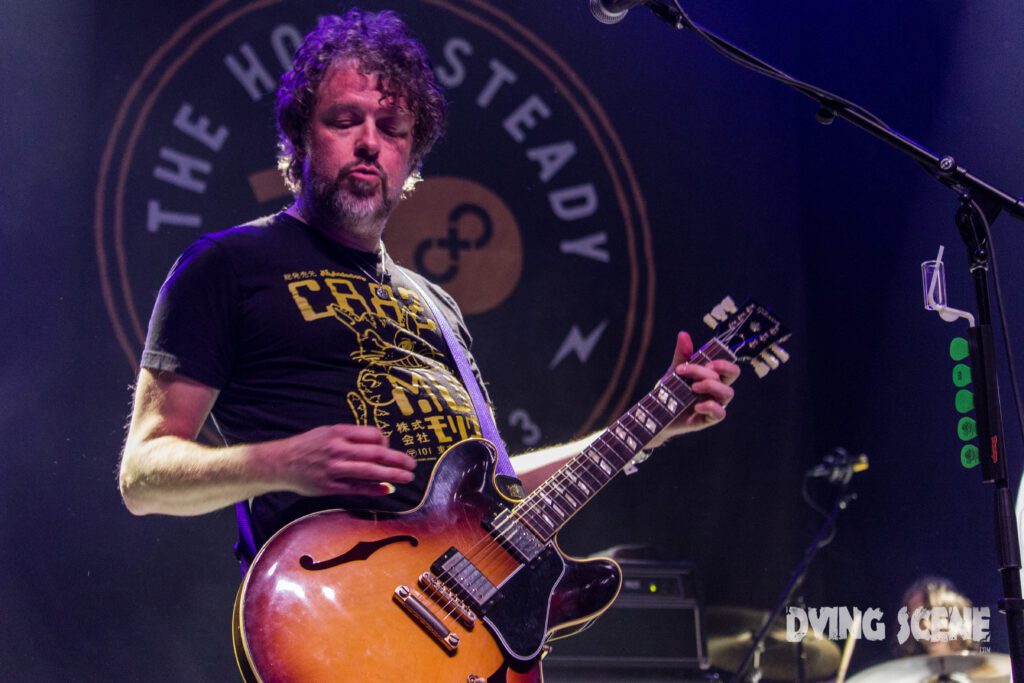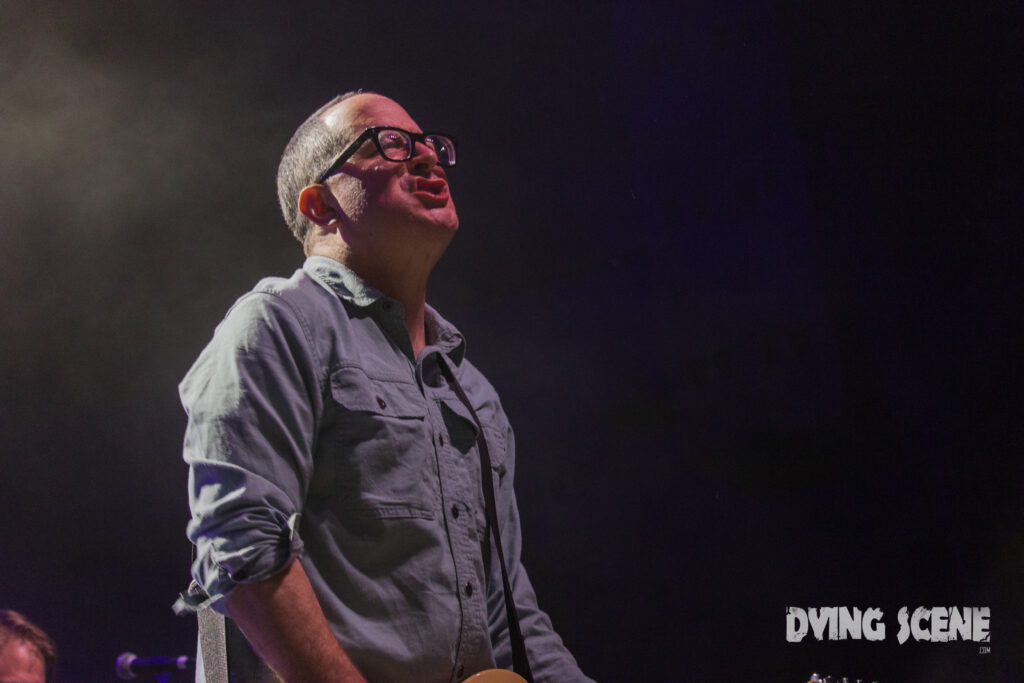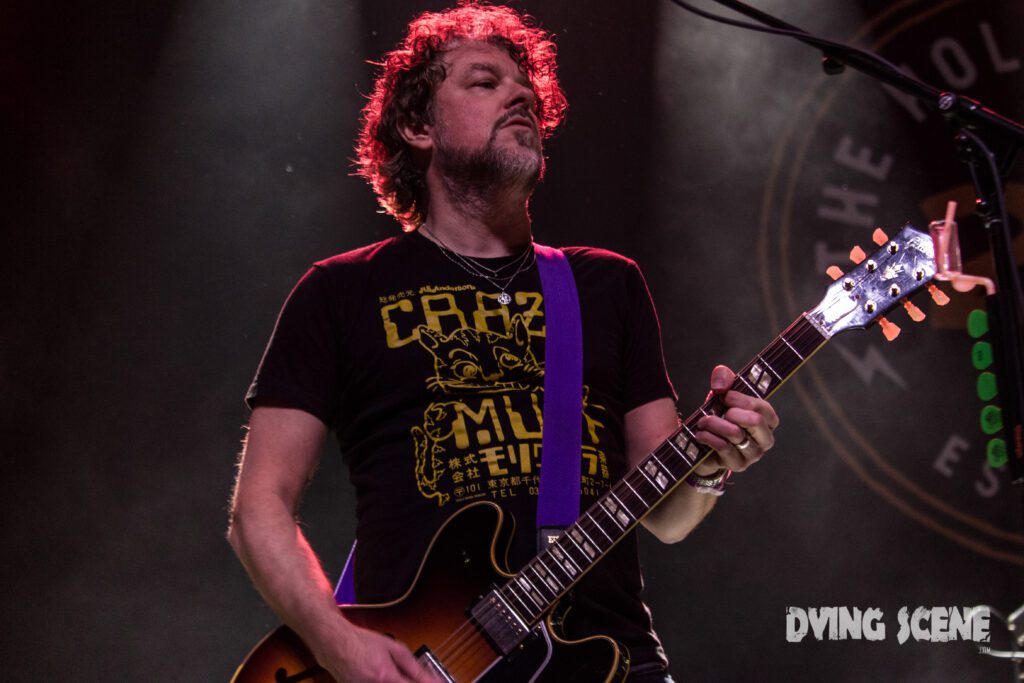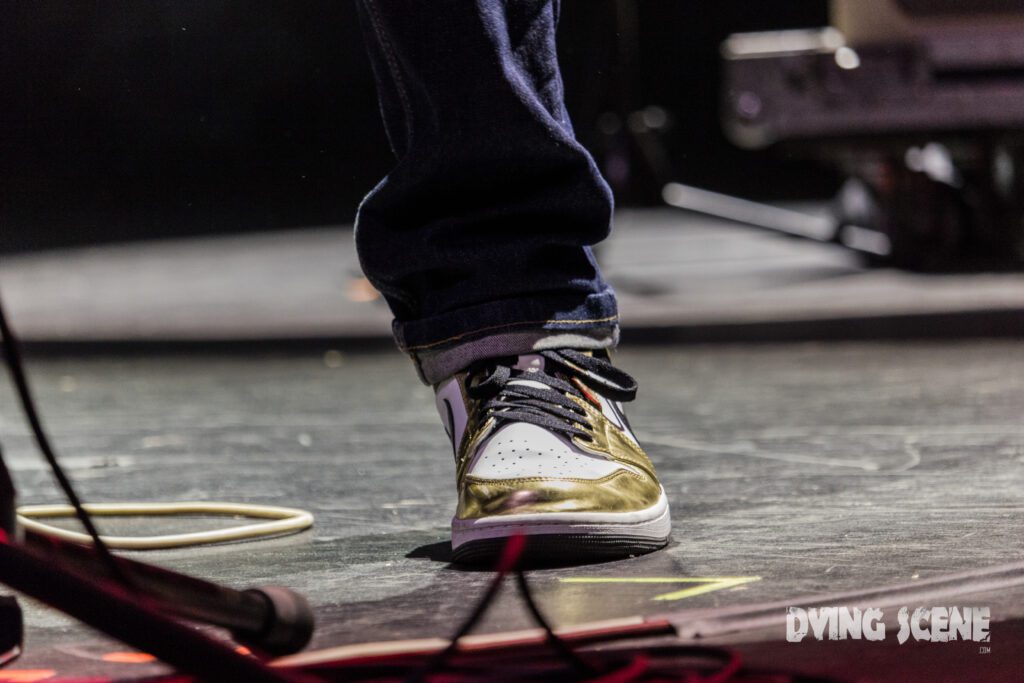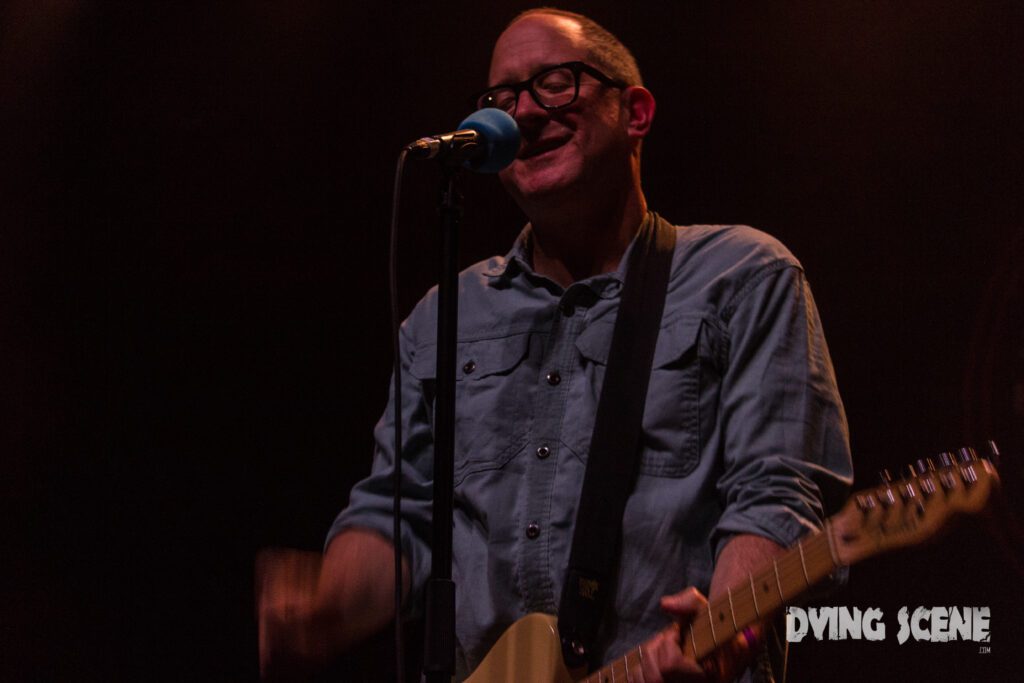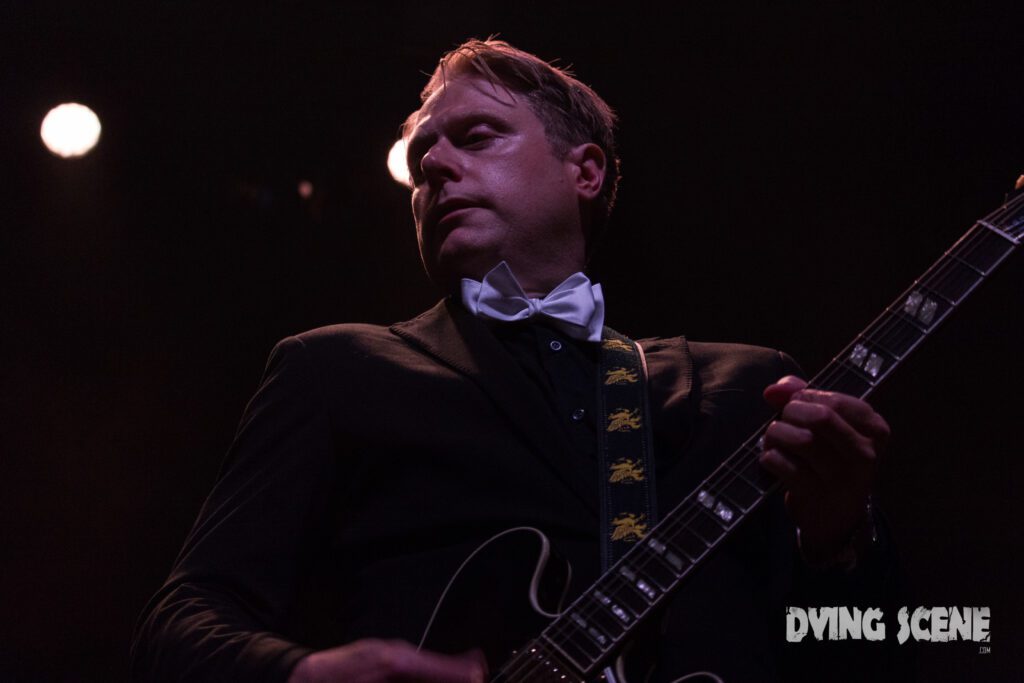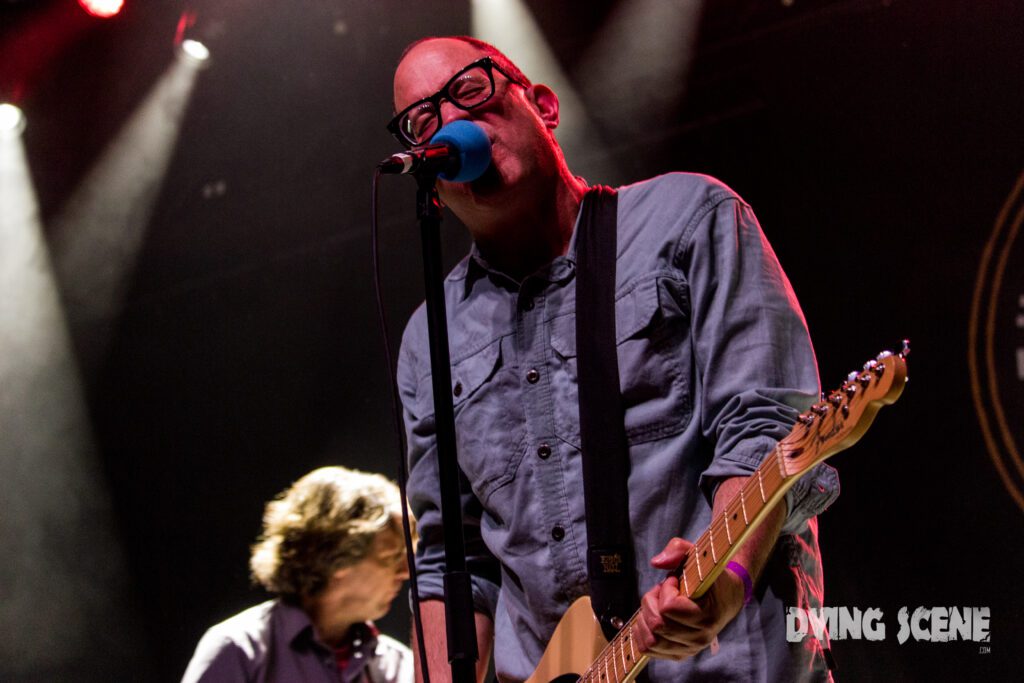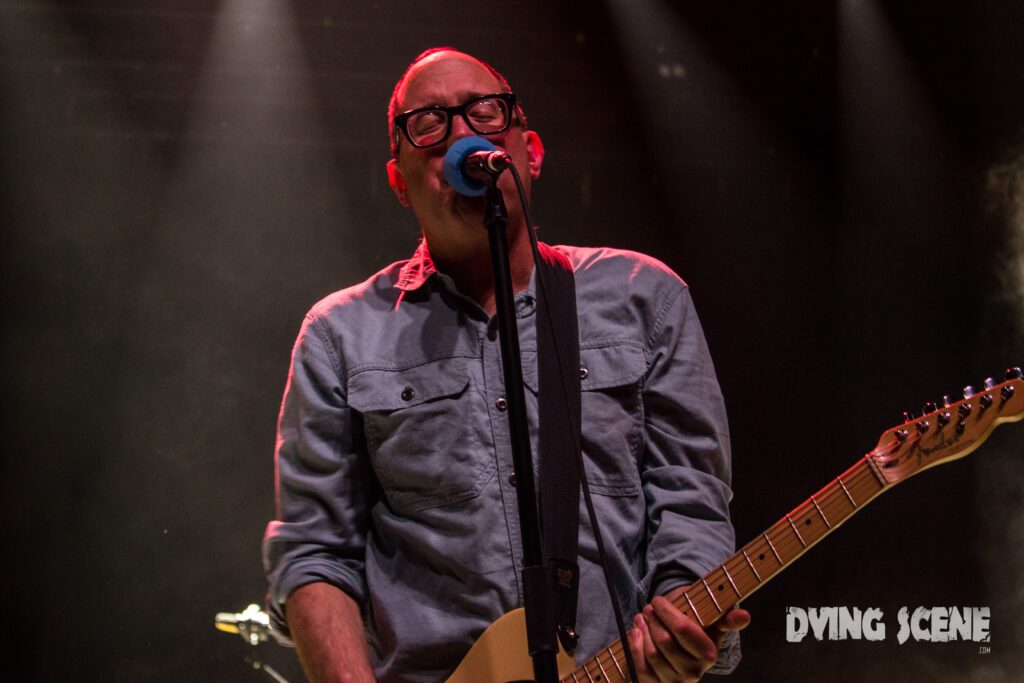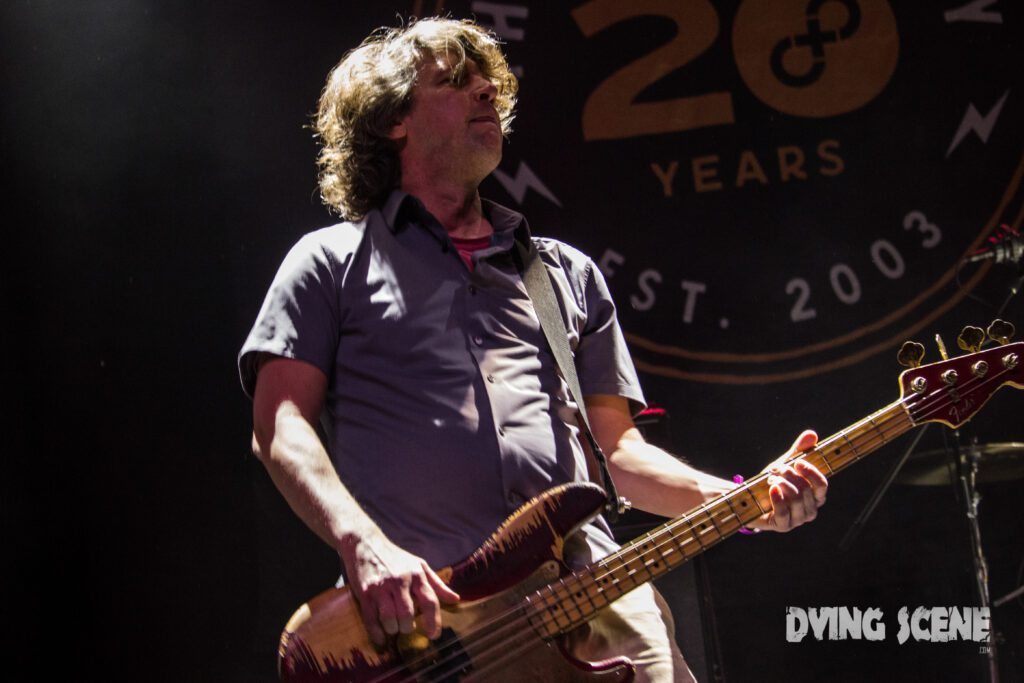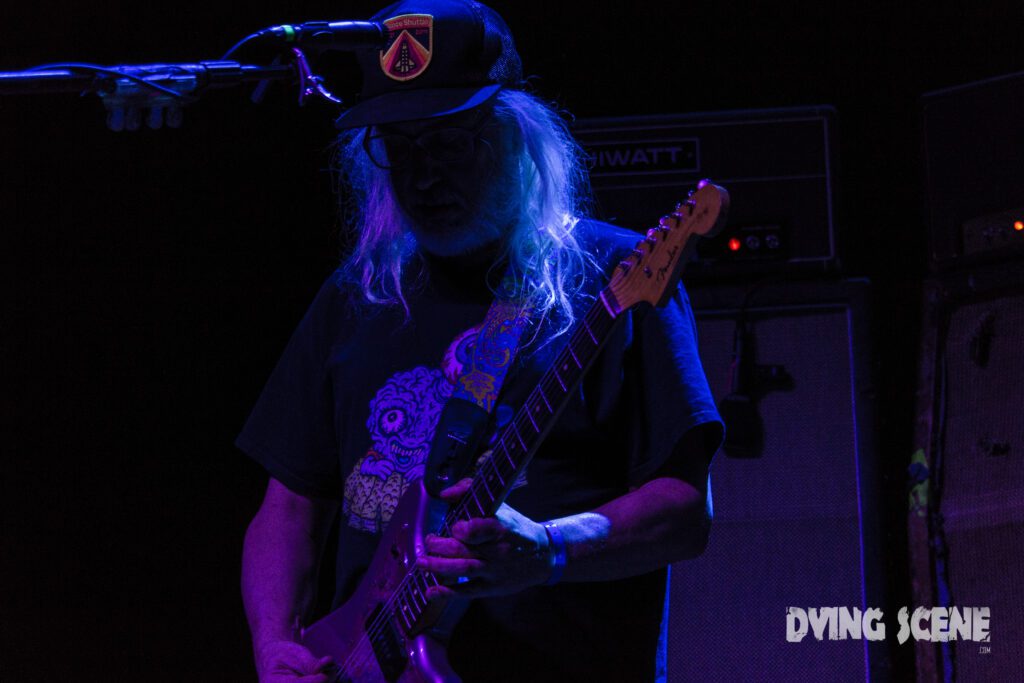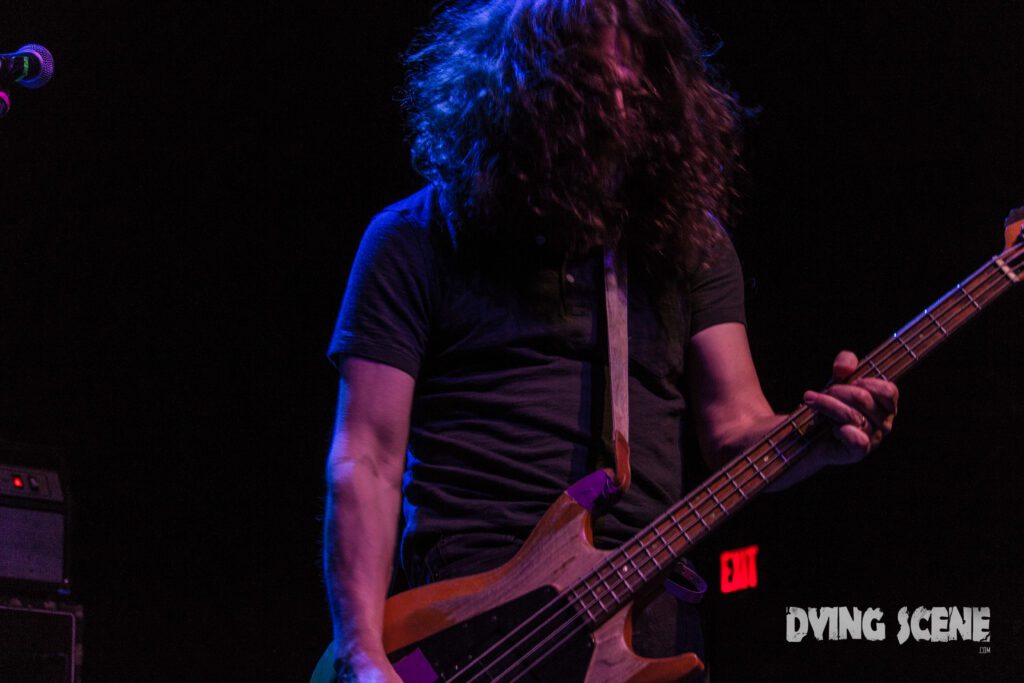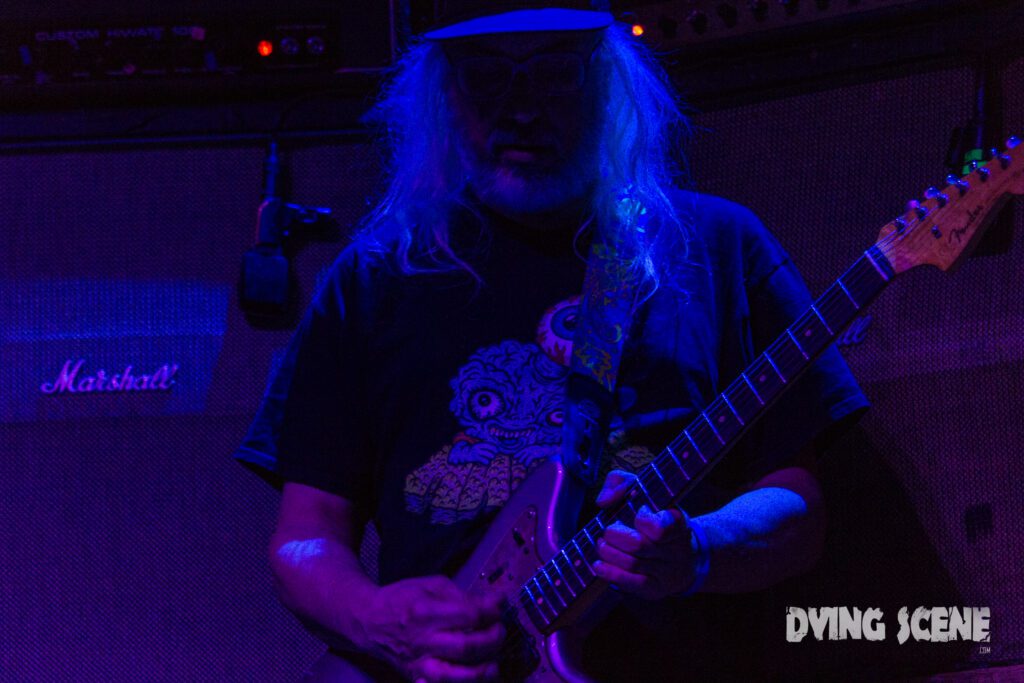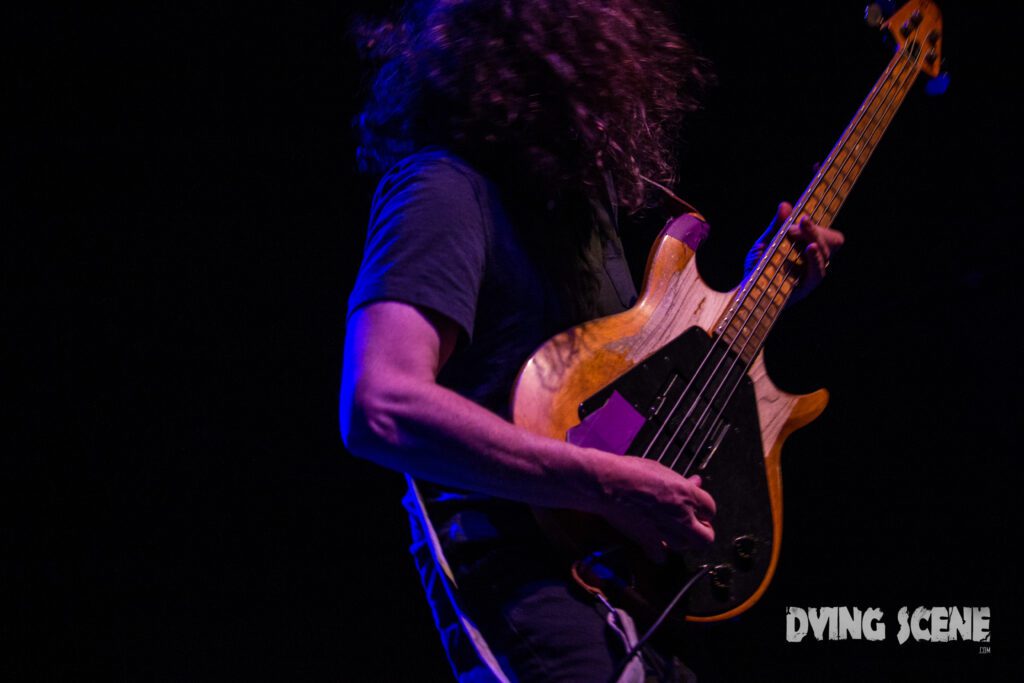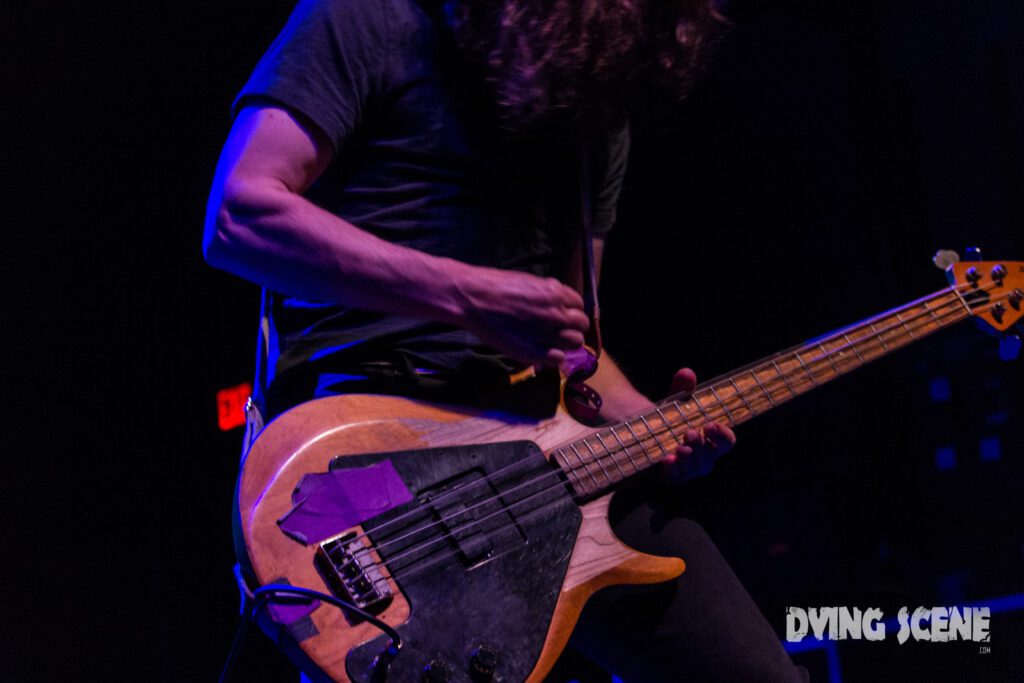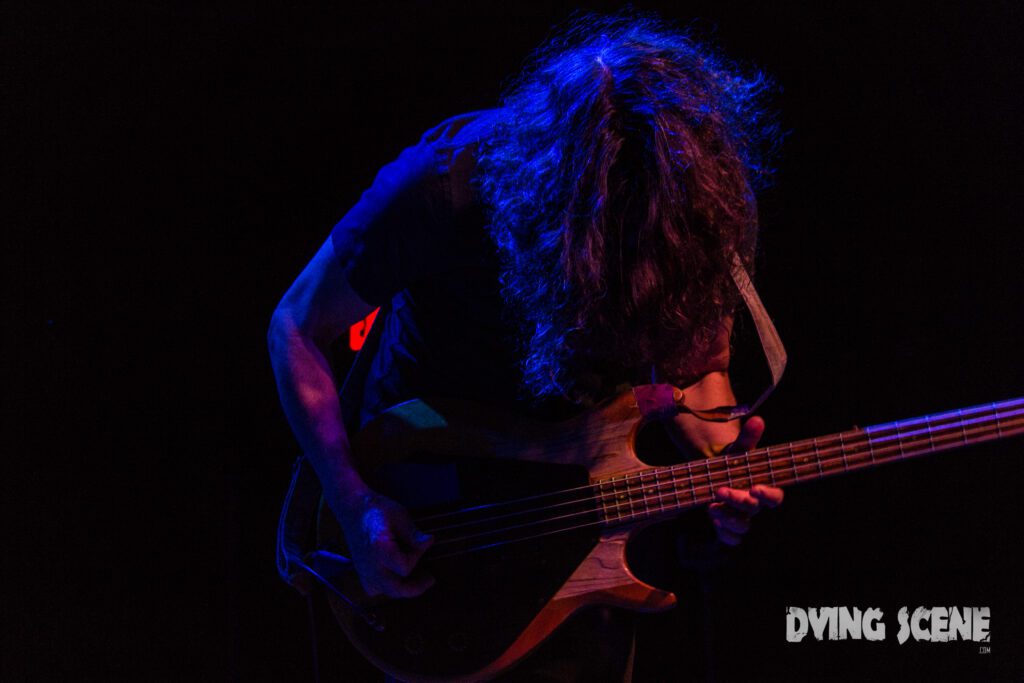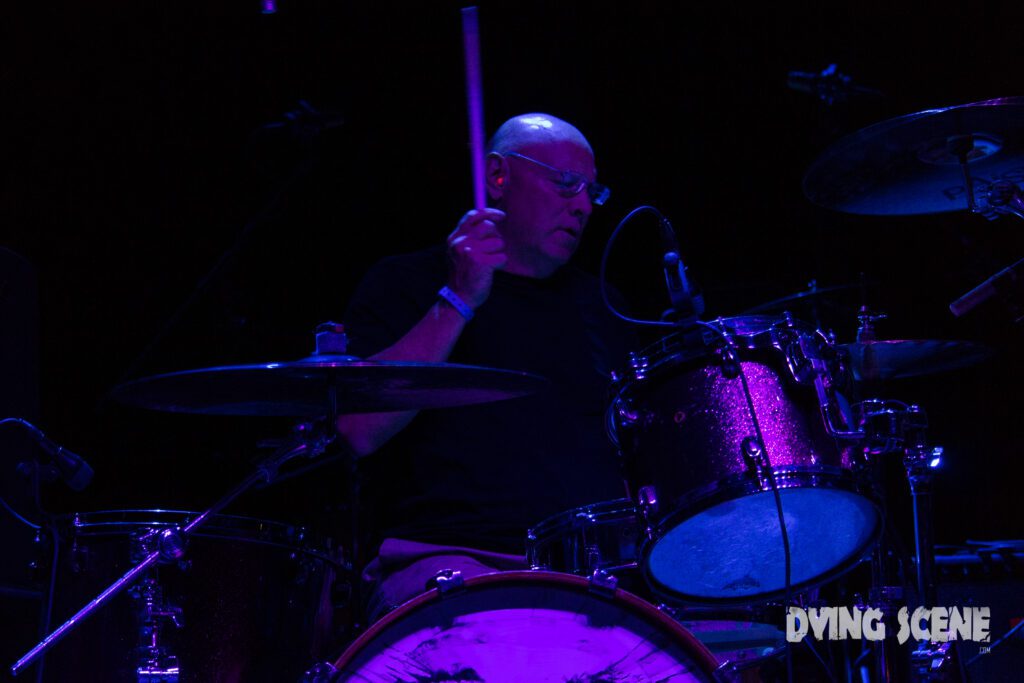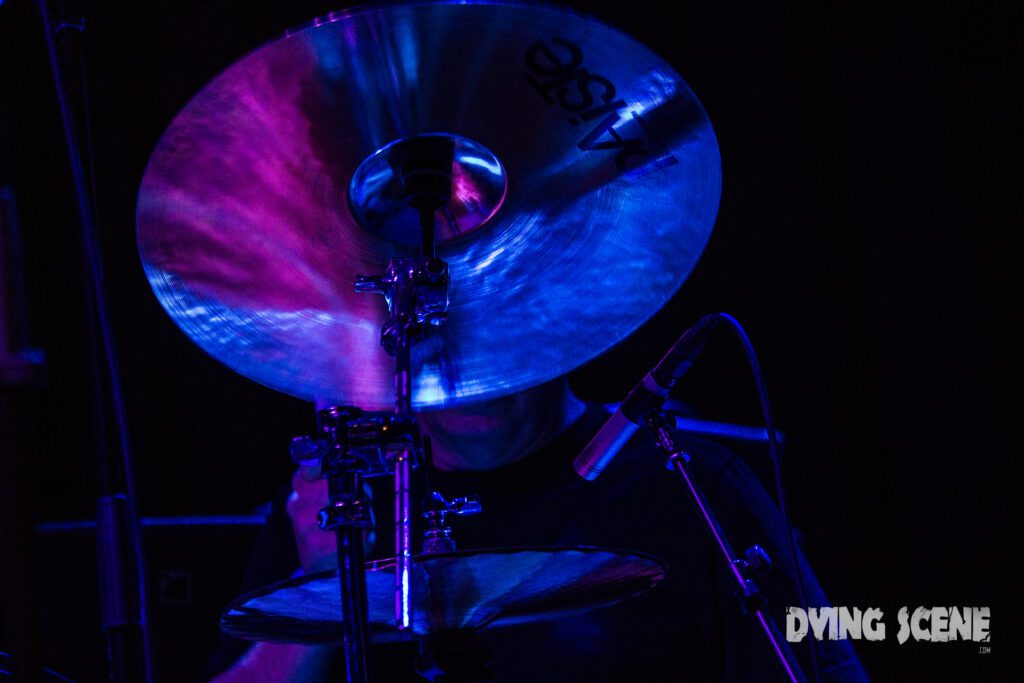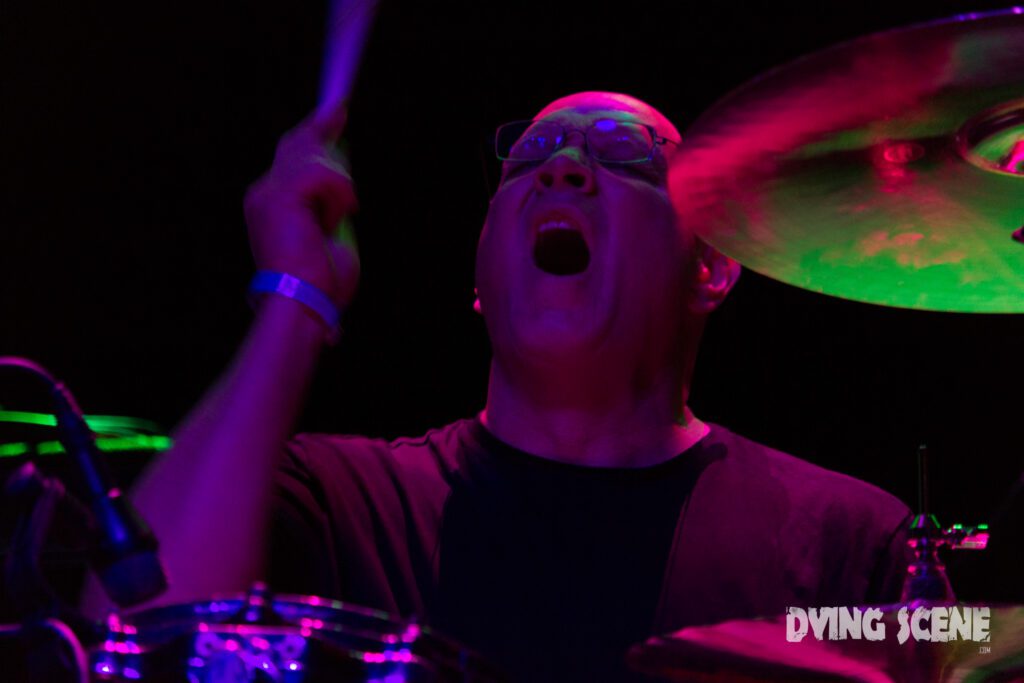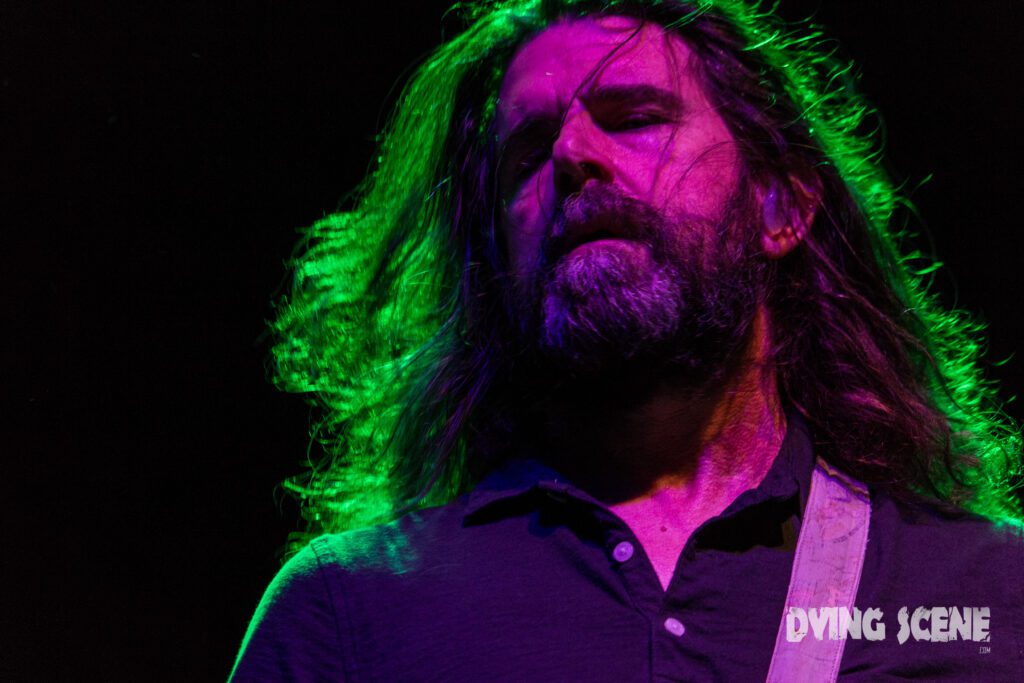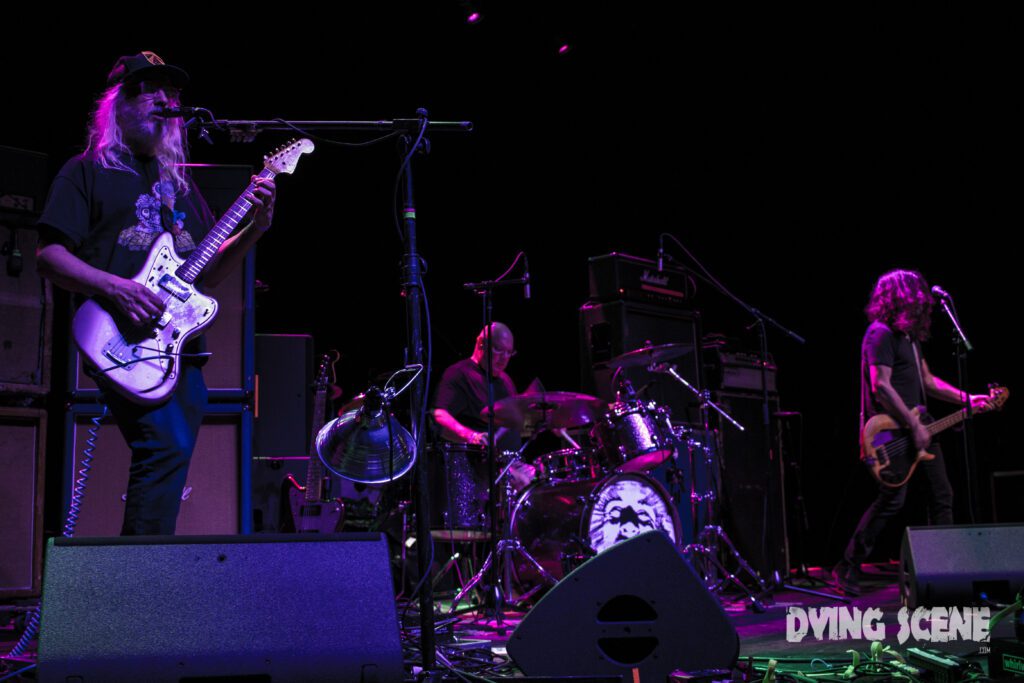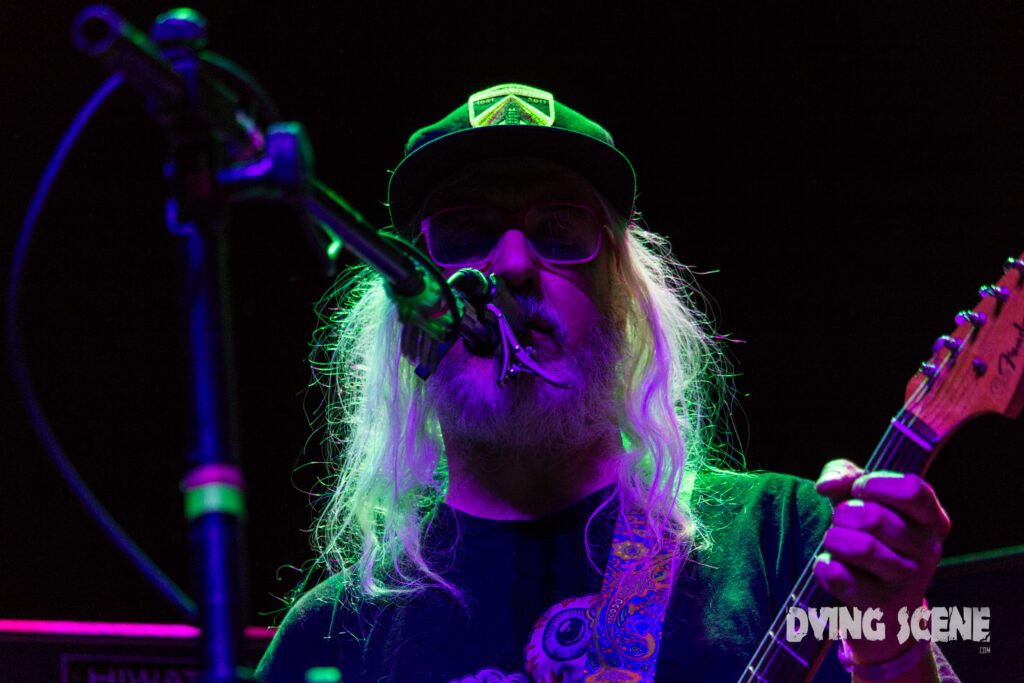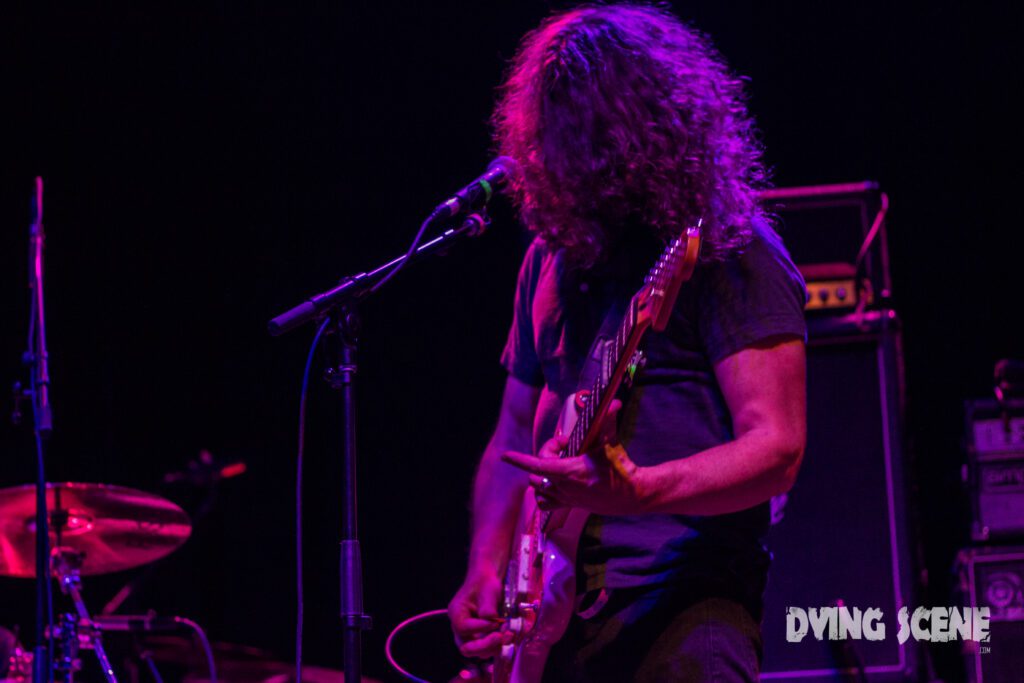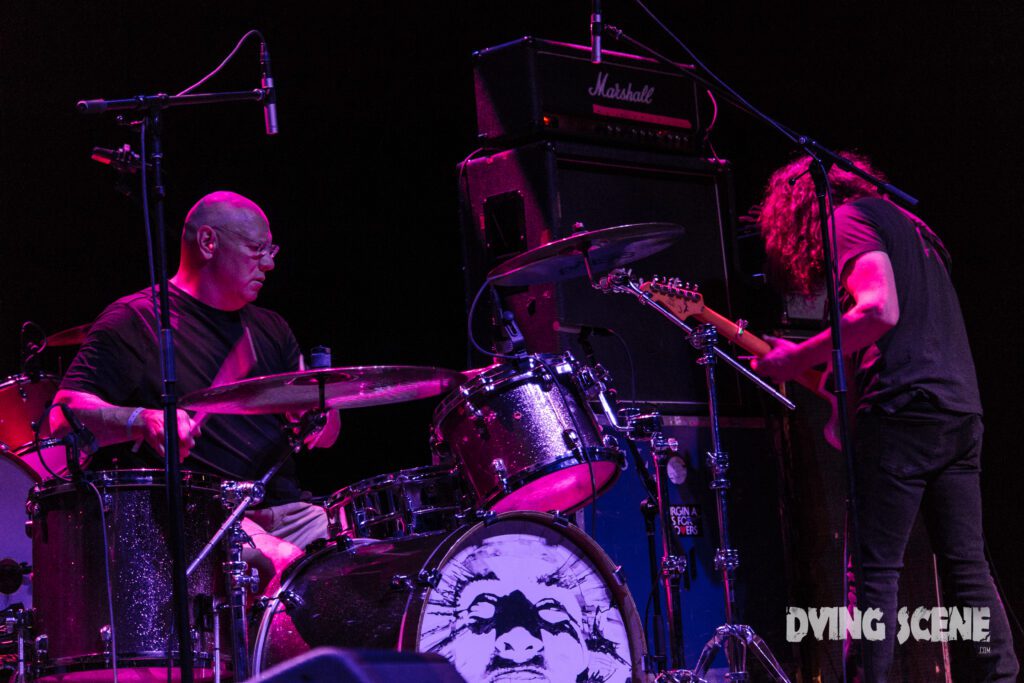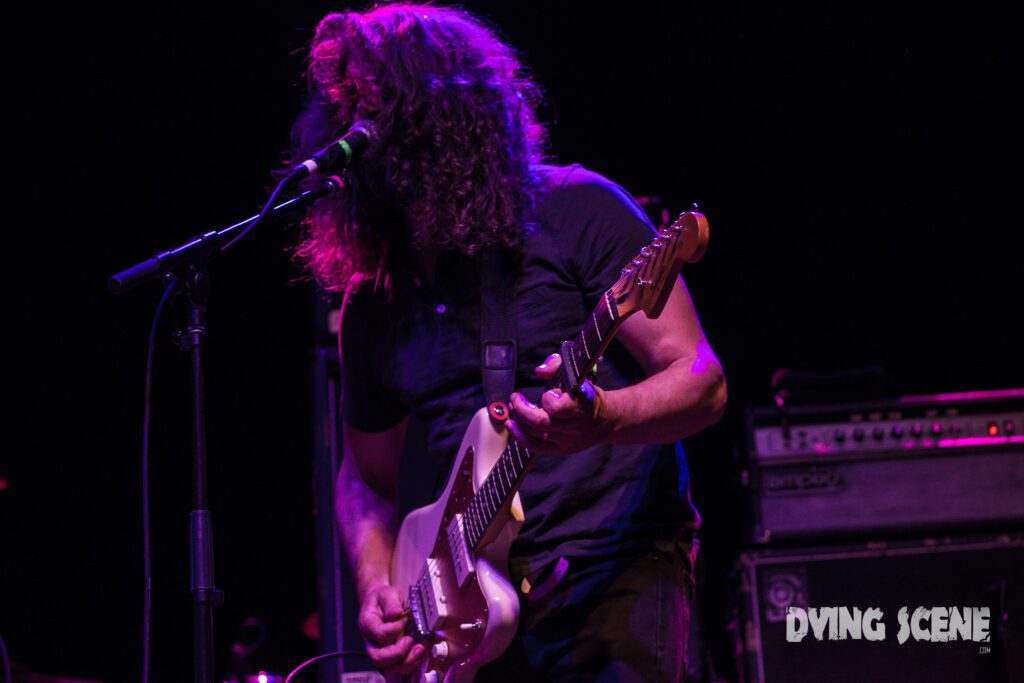I’m not sure how it happened, exactly, but late April marked the official street release of Drive It Like It’s Stolen, Dave Hause’s sixth solo studio album. I say street release because anyone who ordered the physical album from him, whether in the States or abroad, got the album well in advance, meaning folks with access to record players got to hear the album and fall in love with it well before their digital-only counterparts did the same. It’s not unlike how Pearl Jam released Vitalogy back in 1994, only that was a matter of the vinyl coming out maybe two weeks earlier not several months earlier, and that was also not a matter of Pearl Jam owning their own record label as Dave and his brother Tim do (Blood Harmony Records). But I digress…

I say “I’m not sure how it happened” because it seems like it wasn’t long ago that Dave and I caught up before a show at Boston’s House Of Blues, where he was slated to open for Flogging Molly later in the evening. It was the first real sit-down interview of my Dying Scene “career.” Back then, one of the topics of conversation was that he was about to rent a car and drive solo for the rest of that tour because he was experiencing a few stuck points in finishing the writing for the album that he was slated to record once that tour was over. It was an album – Devour – that would eventually cement Hause’s position as a bona fide solo artist and not just “Dave from The Loved Ones.”
And now here we are, more than a decade later. To say that Dave has grown and matured and progressed as both an artist and a human is to worldly understate things. Much of that growth and maturation has been laid bare over the course of the now half-dozen albums that form the Dave Hause solo oeuvre. Six albums is a long enough time into a career for an artist to have not only established themselves as a lasting artist but to have started to branch out and explore new stylistic and creative directions. Think 1372 Overton Park or Rubber Soul or Aladdin Sane or Nebraska or Highway 61 Revisited.
If you’ve heard Drive It Like It’s Stolen at this point, you’re no doubt aware that Hause took the opportunity to lean into some new and different sounds and tones and textures, resulting in what is – at least musically – his most ambitious and artistic record to date. That is not only by design, we can probably expect more of it going forward. “There is a lot of new ground being covered, and there is a certain ferocity with which I’m trying to do that,” explains Hause. “I think going forward, I’m going to lean further into that. I’m not really looking to repeat myself.” While there were hints at newer musical directions on past records, some of the vigor that he applied to the writing process this time stemmed from a decision that his brother and longtime songwriting partner Tim made earlier in the year. While the brothers Hause had been a dynamic creative duo for closing in on a decade at that point – at least since parts of Dave’s 2017 release Bury Me In Philly – Tim decided it was time to put his own creative stamp under an album of his own. (Here’s our interview from back in January about that very release.)

“Once he did that and made all of the creative decisions that needed to be made,” states the elder Hause, “he did that with a ferocity that didn’t so much have me in mind.” While they continued to remain co-writing partners, once the initial sting of not being involved in the studio when Tim went back to Nashville to work with Will Hoge on the album that would become TIM wore off – “I would never give myself the night off (like that)” Dave jokes – big brother was left with the realization that he, too, could exert a little more one-sided creative control over his own future projects.
It doesn’t take much more than one cursory listen through Drive It Like It’s Stolen to realize that while there are definitely some “Dave Hause songs” on it – that four-on-the-floor, punk-adjacent rock and roll thing that seems to be the core of his wheelhouse, there are more than a few curveballs (or sweepers or whatever we’re supposed to call off-speed pitches nowadays) in the mix. Perhaps the most jarring stylistic departure is the coda at the end of “lashingout.” The song deals with the uniquely American and primarily male phenomenon of creating physical chaos, escalating with the narrator expressing the school shooter-esque desire to play God and wreak havoc on those around you…set to a piece of music that transitions from finger-picked acoustic to distorted banjo to piano-driven Wild West saloon ragtime. “Everyone kind of looked at me like I was crazy” says Hause of the end of that song. “Everyone was like “What the fuck is he doing?” And then it worked. It clicked, and everyone was like “Oh this is so dark and so demented, and it adds a gravity to the song that wasn’t there before.”
At first listen, “lashingout” and its equally curiously-named “chainsaweyes” – the latter with its musical bed that consists of a synth loop and dark, haunting strings – are two songs that are stylistically different enough that it would have been understandable to have left them to appear on a B-sides collection some Bandcamp Friday years from now. And there were a few other songs that, while not quite finished, certainly could have been rushed into completion once Hause arrived back at the studio in Nashville, and that may have resulted in an album that fits some preconceived notion of what a Dave Hause album sounds like. But Hause and Will Hoge – back for his third stint in the producer’s chair on a Hause family album – decided that that which was not quite finished should remain that way, at least for now, as it probably pointed toward a different direction anyway, and it doesn’t makes sense to move on to what comes next if you haven’t yet finished what’s in front of you.
It’s a bit of an interesting needle to try to thread; leaning into whatever weirdness or different textures a song may need while being careful to not just be weird for the sake of being weird. “I don’t want to make reckless artistic decisions for the sake of recklessness, but I do want to be fearless in the way I go forward,” Hause explains, adding “I don’t want to do things in a self-destructive way, like “I’m going to make this super weird record to see if I can fool people!” It would be more “Hey, this is what I’m hearing in my head and I want to bring it to bear and surprise myself and surprise the people around me and give people what they didn’t know they needed.”
Those of us that exist in the center of the Venn diagram that has “pretend music critics” on one side and “actual music fans” on the other give artists like Hause props for making the music that he wants to create and not rolling out the same boilerplate album every couple of years. It’s an idea that’s not lost on Hause himself, albeit more than a tad self-depricatingly: “I may end up accidentally getting more credit than I deserve for that,” he jokes. “Like ‘Oh Dave just does whatever the fuck he wants‘ and that sort of thing. It’s like, no, I just don’t have any hits!” It’s a sentiment that’s also reflected in Drive It Like It’s Stolen’s penultimate track, “Tarnish”: “I found a golden goose here and I’m squeezing it for songs / I never got a golden record, I guess the melodies were wrong.” The song serves as a sort of love letter to his twin boys and the hope that as they grow and learn about some of their dad’s trials and tribulations, they don’t lose the glimmer and child-like adoration that kids should have for their old man.
“Tarnish” leads into Drive It Like Its Stolen‘s closing track “The Vulture,” combining for a brilliant – if incredibly heavy – one-two punch that closes out the album as a sort of micro-level companion to the macro-level post-apocalyptic openers of “Cheap Seats (New Years Day, NYC, 2042)” and “Pedal Down.” “The Vulture” deals with the harrowing realization that you may have passed on some of your own negative behaviors and conditions to your children and how best to help them succeed where you might not have. While Hause is a hopeful and positive type in person, he’s at his creative best when he’s grappling with some of the complex and pessimistic realities of American life circa present-day. “That’s the weird thing,” he explains. “I want joy in my music, I want celebration, I want those up moments to be represented, but that’s not what’s constantly on my mind as a person, so it’s a fight! It’s a fight to determine where you’re at, how stable you are, how steady you are, and that’s what comes out in the writing every now and again. In this instance, it’s really in there.”
While the financial payout from having a bona fide hit or two in his arsenal would certainly help, what with a wife and four-year-old twin boys to consider, Hause seems more than happen to trade that financial windfall for an artistic one, particularly one that grapples with some weighty issues in a personal and yet fulfilling way. “I know friends of mine who are tempted (to continue chasing a particular sound after producing a hit). That’s not that appealing to me. The financial stability that would come along with having a couple of hits would be great. But what that does to an artistic career can be troublesome if you don’t handle it right.”
The Brothers’ Hause started their own label, Blood Harmony Records, a handful of years ago. Not an offshoot or subsidiary of a larger, corporate behemoth; it’s their very own boutique if you will. As such, they’ve figured out a way to maximize the economic payout when someone buys an album or a t-shirt or a snowglobe bearing the family name. Hause is also quick to point out that the collection of fans he’s got in his corner – affectionately called the Rankers and/or the Rankers & Rotters in some corners of the interweb – make it not only possible, but play their own part in keeping the pedal down. “For whatever reason, maybe because it’s a smaller career, but I do think that the audience and I have been good to each other. I think everybody is kind of okay with going on the journey.” As a result, the Hauses have also figured out a way to maintain a fairly steady albeit intimate manner of touring that keeps the personal and professional lights on. “On the East Coast we can have a band, in Europe we can have a band, on the West Coast we can have a band, lots of other places we can just go Tim and I, or maybe Tim and me and Mark (Masefield) or something.”

That band, The Mermaid, has had a variety of interchangeable parts over the years, anchored by Dave and Tim Hause and generally longtime collaborator and fellow former East Coaster living in Southern California Kevin Conroy behind the drumkit. Hause emphatically calls the current iteration of The Mermaid, which features the multi-talented, multi-instrumental Mark Masefield on keys and sometimes accordion and whatever else the brothers throw into the mix, and bona fide songwriter in his own right Luke Preston on bass, “the best band I’ve ever played in,” and with them at his side, Dave and Tim decided this year would be the ideal time to bring idea that could very reasonably have been referred to as a pipe-dream-at-best into fruition: their very own music festival.
Taking its name from a song on Dave’s first solo record, 2011’s Resolutions, the first annual installment of the Sing Us Home Festival was held last month and marked a number of different milestones for the Hause brothers. After a successful Mermaid show at their hometown’s Union Transfer in April 2022, the brothers thought it would be a good idea to go bigger, in this case, to throw a two-day outdoor festival in their ancestral homeland, Philadelphia (Tim and his wife still live there, Dave moved to California a decade ago). But not in Center City or in the South Philly wasteland sporting complex area. Rather, they decided to have it in their old Lower Northwest neighborhood of Manayunk, a less-traveled, almost small town part of the big city on the banks of the Schuylkill River.
What could have been an admittedly hair-brained idea was taken seriously from the outset by the brothers’ manager, Alex Fang. “He was really excited about the idea and really saw the potential in it,” Hause explains, adding, “what that really means is you’re having meetings with the Manayunk Development Corporation and you’re meeting with the city and you’re filling out permits…the very unsexy stuff.” Unsexy, sure, but no doubt necessary if you’re trying to build an event from scratch in an area that isn’t used to having such events. “We wanted to put our stamp on the city, and we wanted to do it in our old neighborhood,” states Hause. “It takes over a year to make it happen, and if it rains, you’re fucked. If L & I (Department of Licensure and Inspections) shuts you down, you’re doomed. There’s just so much risk involved.”
The risk paid off. By all accounts, the two-day festival which, in addition to Dave and Tim solo and with the Mermaid, featured appearances from Lydia Loveless, The Hold Steady’s Craig Finn, Kathleen Edwards, Catbite, Drive-By Truckers, and more. “We had a successful one…I didn’t move in with my dad afterwards!” he jokes. “Everyone from 3 years old to 83 years old had a great time. People just had a blast, and that’s such a joyful thing to know that we had a hand in. If it never happens again – which it will, we’re going to do it again (hold the dates of May 3-5 open on your 2024 calendars, comrades) – but if that was it, I feel like those are two days that I’ll remember for the rest of my life as being just spectacular.”
You can head below to read our most sprawling Q&A with Dave Hause to date. Lots of info about the new album and about Tim’s record and about the newest additions to The Mermaid and about Sing Us Home and about therapy and sobriety and his always-evolving roles as a husband and a parent. Do yourself a favor and pick up Drive It Like It’s Stolen here or at least hit the ol’ play button on the Spotify thingy below while you read!
The following has been edited and condensed and reformatted from two separate conversations for content and clarity’s sake.
Yes, really.
Dying Scene (Jay Stone): I was looking at my list recently, and it’s ten years now that we’ve been doing this.
Dave Hause: Terrific, man! That’s awesome.
Drive It Like It’s Stolen is album number six. First off, congratulations. Second off, I totally ripped this off, but do you listen to Craig Finn’s podcast (That’s How I Remember It)?
I have heard it. I haven’t made it to every one, but I have listened to some of them.
I certainly haven’t listened to all of them either, but I’ve listened to a bunch, and he just did a live episode to finish the second season…
Yeah, the one with The Hold Steady. I did hear that one.
Yeah! Their new record, The Price Of Progress, is their ninth record, so he asked everyone in the band what their favorite ninth record of all time was – and he had a list. So I thought, out of curiosity, I wonder what exists in that realm for sixth records…
Oh, good question!
So there are certainly a bunch that were way outside my wheelhouse so I didn’t write them down, but these are a combination of some big ones and then some of both of our overlapping musical tastes. R.E.M. – Green, which the hipsters say is like their last “good album.” White Stripes – Icky Thump. The Doors – L.A. Woman. The Cure’s The Head On The Door, and The Beatles Rubber Soul, which to me is an interesting one. Pearl Jam’s Binaural, The Hold Steady’s Teeth Dreams, and the Bouncing Souls’ Anchors Aweigh. So that’s where Drive It Like It’s Stolen falls in terms of career arc. Are any of those things that you listen to regularly now?
I’m familiar with all of those records, but the only theme that is scary that has emerged as you named them all is they are all precipice records. Certainly Rubber Soul gave way to a lot of really cool music. I love that period. I think everybody kind of loves that Rubber Soul and Revolver period. Icky Thump, I love that record. But I do think that for all of those records, you have most of those at maybe their artistic high points? After that, there is obviously tons of greatness that came from every one of them. But you also named all bands, right?
That’s true, you’re right. No solo artists. And I think that’s because I accidentally skipped David Bowie’s Aladdin Sane. That was his sixth record and it was when he had killed off…
Ziggy Stardust!
Yes! And so also obviously a transition record for him.
So maybe that’s the best theme from the ones you named is that they’re all transition records. Bands were sort of wrapping up a phase and moving into a new phase. But then, I’m not a band. And the way (Tim and I) create is peculiar. One thing for me is that I’ve embraced the peculiarities in my career. If you look at it more from the objective point of record-making, I made kind of five records – the Paint It Black record, two Loved Ones records and Resolutions and Devour – all in a ten-year period. And then I took a break. It was a three-and-a-half-year break. I moved to California and all that stuff, so there was a weird space in there. And then my record-making career resumed in 2017 and it hasn’t really stopped. It’s been between eighteen and twenty-four months ever since, and sometimes even less than that. There’s also a cover record in there. So I don’t know, those parallels to draw between other artists are fun, but I remember sitting down and doing this with Bury Me In Philly, and that’s part of what took me so long to finish it. I was looking at what other artists did with their third records. Those were big records for my heroes. That’s Damn The Torpedoes and Born To Run and all that kind of jazz. (But in some ways) that wasn’t my third record, it was my fifth because I had done the two Loved Ones records. So it’s all confusing. But I would say for those, the one thing that could be true is that this could be transitional. I think just in terms of bringing creative songs to bear, going from the germ of the idea, sussing it out, recording it, and then bringing it to people, I want to try significantly new things, and I think you can hear that on this record.
Oh definitely!
There is a lot of new ground being covered, and there is a certain ferocity with which I’m trying to do that. I think going forward, I’m going to lean further into that. I’m not really looking to repeat myself. I never really have, but I do think I’m just less and less concerned with like, okay, “do we have an up-tempo song? Do we have a quiet song?” Those little checklists that you sometimes find yourself making as you near the studio, I’m not making as many. I just don’t care as much. I’m more interested in what we’re going to etch onto the door, to mark where we are at that year. Because I plan to make a bunch more records. A lot of what’s going now is that I’ve made a bunch of records, depending on who you ask it’s six or eight or ten…and at that point, I kind of at least know how to get them done. I don’t necessarily know what I’m doing (*both laugh*), but I know how to get a record completed and then into people’s hands. Knowing that much is exciting and looking back and going “oh wow, we’ve done this much work!” – that emboldens me to do more work. If that’s any kind of suitable answer! (*both laugh*)

Oh it definitely is, and I think it invites a bunch more questions! I think Tim tipped me off to you leaning into that new direction in the studio. I’m trying to remember the timeline, but it was either when he and I talked for his record or when he was here on that run with Will Hoge. He was like “Dave really went for it and embraced some weirdness in the studio this time.” He was super proud of you sort of trusting that instinct to go for it and to not worry about things so much. “Weird” is obviously oversimplifying things quite a bit, but did that come from the writing process in your home lab making music, or did that come from being in the studio and figuring out how to translate the songs as they started out into what ended up being on the record?
It’s interesting that you bring up Tim, because I think when he made his record, we hit another crossroads in our writing life, where he wanted to make a record of his own, and he went and did it without me to sort of avoid the shadow that I would cast on it. And then as he sort of rolled it out…
Not to interrupt, but was that a mutual idea or was that a Tim idea, and if it was a Tim idea, how did that land when he brought it up?
It was certainly his idea. I would never give myself the night off (*both laugh*). I would never opt to not be in the studio, but I did think it was wise. I thought it was an interesting choice. I mean, I wanted to go, but I also respected the decision and I thought “This will be interesting.” I think he was really just trying to distinguish himself, as you do when you make a record of your own. Once he did that and made all of the creative decisions that needed to be made from then on in, whether it was mixing or what it looks like, or deciding how it is going to come out, etc. etc., he did that with a ferocity that didn’t so much have me in mind, which I really liked. I found it a little bit peculiar because I felt like I had made a lot of room for Tim on Blood Harmony and Kick – not as much on Bury Me In Philly, but that was sort of his initial brush with record-making. Especially on Kick, it was really almost a duo presentation. We’re both in the pictures in the liner notes…
And the album just says “Hause” on the cover
Right! That was another thing we were toying with was a potential rebrand. Because he brought “The Ditch” to that record and that was a major song for it. And so, I was trying to make as much room for him as I could, and really at some points considering rebranding as a duo. And we did an interview with Benny (Horowitz) from Gaslight (Anthem) and he was sort of off-handedly suggesting “Why don’t you guys rebrand as a duo and only come out with the best ten songs that you guys write every time you want to make a record, and then you’ll have the strongest material?” I feel like that’s kind of what we were toying with in the first place, so to have him suggest it was a bit of a mirror. But, as he said it out loud, I thought “That’s a commercial decision.” That, again, is sort of not embracing what we actually have, and what we actually have is this strange, developing story. If people take a second and want to learn about it, it’s really cool and it’s enriching. It’s certainly enriched both of our lives. And we both like to write lots of songs, so why would we do less of that? I love Elvis Costello and Bob Dylan and people who make a lot of work. I don’t always follow all of it, but I like that they’re doing it. I like the act of creation, and I think for me, when (Tim) went and did (made his record), I thought “Well, that gives me license to do the same thing.” I don’t need to make AS MUCH room for him if we’re carving out a niche here for him on the record label and in terms of our presentation; there’s the Tim record, and there will be another Tim record.
So that was really an accidental giving tree. It was like, “Well, I’m not going to ask the question as much as I did before.” Like, when you’re singing a vocal and the producer says “Well, what is it that you want to say there? Are you sure about that?” I would often defer to Tim and ask what he thinks, or Tim would jump in with a syntax issue or an “I don’t really like that guitar tone.” It wasn’t always critical, but when it came to critical decisions, I would defer a lot. In this instance, I was like, “Well, you’ve got your record. (*both laugh*) I know what I’m doing and what I like to hear at least with my own songs, so I’m going to just make the call.” So I think in certain instances, like at the end of “lashingout” everyone kind of looked at me like I was crazy. When that saloon idea came about and that weird banjo, everyone was like “What the fuck is he doing?” And then it worked. It clicked, and everyone was like “Oh this is so dark and so demented, and it adds a gravity to the song that wasn’t there before.” So it was cool to take sort of full lead control again and then see it blossom into something new. Some of that is just recklessness from boredom (*both laugh*). I’ve made records where there was a simple, quiet song with finger-picked guitar. Lots of those. And it just wasn’t the reading that I wanted on that song, you know?
That’s a really interesting song, and we can talk about that more later. But man, that’s a really interesting song.
Thanks man! I think it wasn’t before it got that treatment and before it got that coda at the end, and I also was pretty reckless in terms of not being precious. Once you get six albums in, you’ve seen songs live and die, you’ve seen songs come back, you’ve seen songs that surprised you and that had lives of their own, that you didn’t think were going to be anything that would poke their head up. So I kind of was ready to delete certain songs or to rearrange the order, or just lean a little bit more into whatever the best artistic decision was. I was just looking for that, I wasn’t really looking for “what song is going to have the best commercial impact” or anything. I felt like a guy in a painting studio just painting whatever he wanted.
Was that from the actual songwriting process before you went into the studio with Will, or was that like once you got in there and started playing around? Because you were only in the studio recording for what, a week or so? So I feel like a lot of that must have been hammered out ahead of time.
There was a lot, yeah. And there were a lot of songs. There are more songs that we didn’t even get into.
That’s always the case with you though, isn’t it? (*laughs*) I feel like every time we talk about a record you’re like “There’s this whole other EP that might never see the light of day…”
It is, yeah! There was also this interesting thing that happened when I was showing Will the material. There were a couple of songs I hadn’t finished that I thought were really good starts, and I played I think two or three of them for him and I said “Well, I could finish these and they would maybe bump off these other ones I’m not sure about,” and he said, “well, you could, but those songs sound like whatever you’re going to do next.” Like, well, I could work hard over the next night or two and finish them up and he very wisely said that they have sort of a different disposition to them. Thematically, he thought “chainsaweyes” I had to do, and he thought “lashingout” was really good and I should put that on, and that the other ones were maybe really promising, but they weren’t done and that they were part of a different batch. When we had those ten or eleven that we initially recorded that each shared a theme and a vibe, then he thought I should run all the way down that road. Once I had that, I knew what the parameters were and we could just let each song have its own identity from a recording perspective.
There’s that thing in “lashingout” – yes, there’s sort of that saloon sound at the end, which is probably the biggest thing that catches peoples’ ears, but as much as I like to pretend I’m an audiophile sometimes, I usually tend to listen to music on my laptop while I’m at work. With the job I have now, I’m not in the car all the time, so I usually just throw it on when I’m at work. But I had headphones on the other day, and I hadn’t caught it probably the first hundred times I heard the song, but there’s that double-tracked vocal in the chorus, and one of them is almost whispered, and that changed the entire song when I finally heard it. It was really jarring A) because I felt dumb for not picking up on it the first hundred times, but B) it really changes the meaning and the tone of the song. That’s an evil sort of thing. The lead vocal is not sweet…that’s the wrong word…but it’s almost considerate. It’s almost like a therapist and you’re trying to talk to a child who might feel like lashing out…but then there’s this whisper voice inside your headphones going “do you feel like lashing out?” like it’s trying to talk you into it. That changed the entirety of the song for me.
That’s essentially the duality of how I view that statement. There’s a bit of a fear that those of us who are raising kids, are you going to raise the next school shooter? That’s a person that obviously at some point has something go really haywire, and I do think the adult urge at 40 to feel like lashing out is not where we want to be. When I’m around my European friends and I’m having dinner with them on tour, they don’t feel like lashing out. I think part of that is the way that their society is structured, and the values that have been cultivated. Whereas here in America, everyone has had their moments where they want to lash out. It’s a really frustrating place to live. That was a tweet of Laura Jane Grace’s, “I feel like lashing out.” And I texted her to see if I could write a song about that, because it was really the duality of it that I was tapped into. I wasn’t looking at it like “This would be a great chorus for a punk rock song.” I mean, partially, yeah, I feel that with her. I feel like lashing out. But I was also concerned about, like, why? Like, please don’t! I hope you don’t lash out and hurt someone or hurt someone else. As I age, there is that thing like “Well, we don’t want to be lashing out. Lashing out is how we got here, you know?” That’s what I’m working on in therapy, so yes I get that a person would be feeling that way, but also, hey, we need to work on that! We need to examine that! (*both laugh*) I think all of that is built into the song, because the song also didn’t have the coda. Once it had the coda on it, then I had a finished product, because I had “I want to be God for a day.” That’s further into the feeling of “I want to lash out.” It’s much more into that mentality, not only do I feel like lashing out, but I want to be God for a day. I want to reign down judgment and make things the way I want them to be.
I think I’ve even heard you talk about it – I think you mentioned it when you were up here in Malden last month, about the sort of duality that exists in that song, but that was the first time I physically heard and felt it because of the way the two vocals are layered on top of each other.
I’m surprised you didn’t hear it because I kept fighting to have it louder! (*both laugh*) I was like “Turn the whisper up so loud that it becomes a prominent thing!”
Well and now it becomes a thing where every time I hear it I’m like “Oh my God, of course, it was right there the whole time.” Anyway, so you went back to Nashville and worked with Will again, but you worked with a whole different lineup this time. Was that by choice or by circumstance? You’ve got some cool people on this record too. That Jack Lawrence has been on some amazing records.
Yeah, he has! It was by choice. We had more of a batch of songs based in American roots music on the last record, and we wanted to make an old-fashioned record where everyone plays together in a nice-sounding studio. It was incumbent upon him to put together that kind of a cast; a cast that would be able to knock it out. With this (record), I was less concerned with that because I was trying to make more of a layered statement. It wasn’t just “go in and cut in a really nice studio with the best players you can find.” It was, like, get what’s best for these songs by any means necessary. We compiled a lot of that on our own and then added people. It was also just me being more comfortable with how Nashville works and knowing that “I’m not worried about getting a trombone player, we’ll find one.” You can’t swing a cat without hitting some incredible musicians. So there’s a confidence in knowing that you can just make this be whatever it needs to be and you can find whoever the players that you need to do that based on the way that the songs are coming.
Whereas, I think for Blood Harmony, that was an exciting and fun way to do that record, based on how those songs felt. They felt more lush and family oriented so it made sense to cut them that way. For this, it was more that we left some stuff unfinished (going into the studio) and said well, we need some strings here, or we need 40 seconds of a band here, let’s find those people. We played the “live band” – in quotes – as almost another fader on the board. Some of that was by virtue of having built loops of my own and mapping things out, and then either rebuilding those loops in the studio or using some of those same loops in the songs you hear. It was just a different process, which, now that I’ve had this new chapter of Nashville recording – we’ve made three studio records and then we cut a bunch more songs there that may or may not see the light of day – but having worked that much there, you just get a feel for it and so it’ll be interesting to go forward from here just knowing more about how that process works. It’s good to have all these experiences and to allow them to kind of build on each other.
You mentioned the sort of “live band” in quotes…sometimes on Blood Harmony, there were a lot of songs that could definitely be played either just you or you and Tim together, but there are some songs on this record that really sound like they were meant for the full band. The first two songs, “Cheap Seats” and “Pedal Down,” are not four-on-the-floor rock and roll songs, but they sound like they’re really built for a band. Does that become a thing you take into account when you are writing – what version of the Dave and Tim touring experience is going to be able to do the most justice to these songs?
No, I just try to make whatever is most compelling and then worry about that stuff later. Hopefully, if we made a sturdy enough song, there’s a way to play it on an acoustic guitar or a piano that will translate. Sometimes we even beat those full-band rock versions. So, no I don’t really think about that. I may end up accidentally getting more credit than I deserve for that, like “Oh Dave just does whatever the fuck he wants” and that sort of thing. It’s like, “No, I just don’t have any hits.” (*both laugh*) If I had a couple hits, they would haunt me…
Because then you’d be trying to recreate them every time you make new music?
I would think that you’d naturally be tempted to, you know? I know friends of mine who are tempted. That’s not that appealing to me. I mean, the financial stability that would come along with having a couple of hits would be great. But what that does to an artistic career can be troublesome if you don’t handle it right. My mother-in-law paints. She just paints and paints and paints and paints. Some paintings sell and some sit on the shelf, and there’s not one that was clearly her best and that was selected by the Smithsonian or something and she has to beat that. It’s more like “Hey, I have a long life of painting.” That’s more of the artistic life that I’ve been given, so I think worrying about how to bring those songs to people is just not something I really worry about. Also, I think there are just too many songs now. So, like, if we’re pulling into a town to play, if we can’t play “Cheap Seats” that night because we don’t have a version ready or we don’t feel compelled by the version we have or we don’t have drums or a sampler or whatever would make the song work the way we did it, we’ll just play a different song. (*laughs*) So no, it’s not as much of a concern.
Does having a wife and kids change that math a little bit? I mean, do you feel like you could go full Tom Waits’ Mule Variations when you have a wife and twins to think about?
I think that’s the kind of thing that compels me! That’s the kind of inspiration that I’m drawing from as I move forward! That’s the bargain that you’re trying to strike up with the world. If there’s a record like that, a Mule Variations, and it doesn’t do what it did for him, where it got him a Grammy, and people don’t like it, I still feel like I’m going to be okay. I don’t think I’d be putting my kids or my wife at risk. Ultimately, I think that the conversation that I’m having with the audience would allow for that. Because I’m not playing that game, you know? I’m not doing that “am I on the radio” thing. I mean, we do that – we do push songs to radio, but it’s not what we live and die by. We own the record label, so people who take a shot on what we’re doing, we get the biggest economic impact from that, and then we tour in a way that is sustainable and smart for the places that we’re at. Like, on the East Coast we can have a band, in Europe we can have a band, on the West Coast we can have a band, lots of other places we can just go Tim and I, or maybe Tim and me and Mark (Masefield) or something. So I’m looking to push into those realms of pure creative inspiration, more than I am about worrying about my wife and kids, because I don’t think those things cancel each other out.
So I guess the other side of that then is that if it doesn’t put your wife and kids at risk financially, maybe it puts dad at risk to not be doing the things he thinks are fulfilling creatively. Not to bridge into the therapy part of the conversation, but if dad is doing the things that he wants to be doing artistically, then maybe he’s less at risk of swan-diving off the Golden Gate Bridge, right? (*laughs*)
Yeah, I think so! I think it’s important to try to balance all of that. I mean, I don’t want to make reckless artistic decisions for the sake of recklessness, but I do want to be fearless in the way I go forward. That’s the needle I’m trying to thread. I don’t want to do things in a self-destructive way, like “I’m going to make this super weird record to see if I can fool people!” It wouldn’t be that. It would be more “Hey, this is what I’m hearing in my head and I want to bring it to bear and surprise myself and surprise the people around me and give people what they didn’t know they needed.”
So, I haven’t commented too much on the record yet because I wanted to wait until we talked, but even from the first listen on crappy laptop speakers, I thought that this was my favorite Dave Hause record since Devour, and you know the regard that I hold for that album. And I will tell you, that I’ve had a few conversations with friends who are also longtime fans of yours and they’ve sort of said that “it’s like a grown-up Devour.” And those weren’t people who know each other, necessarily. But I thought that was interesting. I think thematically the albums are worlds apart, except that there is a sort of processing thing that you’re doing on this record that you were also sort of doing with all that went into Devour. The stakes have changed now because you’ve got a wife and kids obviously, but some of that challenge and struggle is still there. Even though in the press for this album it talks about the sort of post-apocalyptic vibe to the album – and I understand that part of it – but it also seems like it’s really honest and personal.
If you look at it now, there’s six (solo records). You can see that “well, Dave’s feeling pretty good on Resolutions” but then there’s Devour. (*both laugh*) And then “Oh, Dave moved to California for Bury Me In Philly and things are good!” and then “Oh, here comes Kick…” That title is about the struggle of just trying to keep your head above water. The same thing happened with Blood Harmony and this one. They aren’t intended that way, I think there’s just a cycle of how I’m processing the world and sometimes I’m up and sometimes I’m not, and on this one, I was not up! I was starting to feel kind of terrified about the world around me and what I was bringing my kids into, you know? The first couple years, I was just at home quiet with them, because we were all shut down. But in this eagerness to get back and keep the pedal down, all of a sudden we’re faced with a lot of those problems that have worsened since 2020. It’s definitely processing the world around. That’s the weird thing: I want joy in my music, I want celebration, I want those up moments to be represented, but that’s not what’s constantly on my mind as a person, so it’s a fight! It’s a fight to determine where you’re at, how stable you are, how steady you are, and that’s what comes out in the writing every now and again. In this instance, it’s really in there.
“Pedal Down” specifically – first off, I love that song. I love the sonic build to that song. I think there’s something about that you can want joy and harmony and all those things and I think we should probably be striving for those things, but that last third of “Pedal Down” where’s the big full-band chorus…there’s something unifying about that. Even though the situation that’s laid out in the build-up to that is sort of bleak, I think there’s a collective thing that “it sucks for all of us right now, but we’re all doing it together.”
Yeah, I think there’s an ambivalence to that. The “we can grieve it later, keep the pedal down” line isn’t just a negative thing, you know? It might seem that way and a lot of times I think that’s a terrible way to move forward. But there’s also a sort of “no way out but through” a lot of times, and maybe there is celebration in that. Like, we’ll grieve it later, keep the pedal down for now, let’s go. Let’s fucking go!
Exactly, it’s like keep your warpaint on, keep the pedal down, we’ll sort of get granular in looking back on it afterward but for now let’s keep fighting.
Right, yeah! That’s interesting. I think that definitely went into the subconscious of making a big mosh part at the end with trombones, you know? (*both laugh*) There’s something really big at the end and you have to at least have something in mind. I think in the previous song, “Cheap Seats,” there’s this nod to “American Girl,” when we’re off to the races with the rock band. There’s a celebration there too – “Take one last bite of this old rotten apple and ride off to the country with me.” That’s a little bit more deliberate of what you described, like “Alright, let’s start up the van and let’s get the fuck out of here!” I think that weaves its way in and out of the record and I guess a lot of my records if I’m forced to think about it. (*laugh*)
How often do you think about that, and is that a thing…I’m trying to figure out the best way to phrase it…but you’ve talked pretty openly in the past about being in therapy and whatnot; how often do you think your songwriting works its way into therapy, whether it’s because you are talking to your therapist or therapists about what you’re working on or what themes you seem to be coming back or a rut that you might be in that producing a certain kind of material.
I would say it’s the other way around. Realizations and conversations from therapy make their way into songs, because I kind of view therapy as a mirror, you know? If you were going to try to do your own facial, you would try to get the best mirror that you can in order to do that. I think that’s the goal of therapy; find the best mirror that you can find in order to then do the work yourself. You have to do the work yourself…
How many mirrors have you had to go through before you realized it was working? Did you find the right therapist or the right sort of style the first time you tried it?
Yes and no. I’ve got a good guy, but also, my expectations for that guy were different when I walked in versus where they are now. I had these lofty expectations for him that were totally unfair, and I was looking more for an advisor or someone to tell me what to do. That’s not what therapy really is. So I had to learn that it’s what you put into it that you might get out of it. It’s peculiar. And part of that is being married to a therapist. If one of her clients had the attitude that I did going into it, I certainly wouldn’t think that was a fair expectation to have of my wife. Part of that helped. Like “We’ve got an hour here and I’ve got a full day booked, I’m not going to solve all of your problems, and it’s really not my job to solve all your problems. It’s my job to help you see them and guide you.” So I think the work you do both inside therapy and outside it that ends up hopefully informing the songs.
How old were you when you started going to therapy and, I suppose in hindsight, how old do you wish you were when you started going? Like, now that you know what you know, do you wish you had started earlier?
Maybe? I would say that the main regret with sobriety would be that I didn’t go (to therapy) right away. But I try not to look at things that way because you kinda only know what you know when you know it. I’ve had a good life, so it’s not like I can cite this spot where “Man, if I had only gone to therapy then, things would have turned out differently.” Maybe you could do that but I’m not so sure I’d want it any differently. But how old was I…it was years ago, but it wasn’t right when I got sober, and I wish I would have done that. I think when those wounds are really exposed and those nerves are raw, that’s a good time to start working on them and I should have started working on them then. I think it took me two or three more years to go into proper therapy. I got sober in 2015.
Right, that was that big tour with Rocky Votolato and Chris Farren. I feel like maybe we’ve had this conversation even back then, but did you view it as “getting sober” in quotes back then, or was it more of “let me see if I can do this without imbibing”?
Yeah, the goal was to try to do a tour without boozing and drugging. That was my initial goal. And that was a long tour. That was an eight-week run, so there was something about the length of it that even subconsciously I was like “I wonder if I can do this…” Then, like with a lot of things in my life, I sort of fell backwards into things, you know? Like “Let me try being sober for eight weeks and then if it’s working for me, I’ll keep going.” “Let me roadie for a popular band and if I like that lifestyle, I’ll continue.” (*both laugh*) The thing with sobriety is that the one thing I wonder about is that had I gone in sooner, would I be as black and white about it? Would I be “sober guy” where I don’t drink at all or do drugs at all, or would I have a more balanced take on it, which I think in my objective brain, I do. I can sort of see the benefit of psilocybin or THC or having a ballgame beer. I can make those distinctions intellectually and the reason I don’t go back to it is, like, the juice ain’t worth the squeeze. I’ve got four-year-olds, I’ve got a wife, I’ve got a career, I don’t want to fuck things up.
But I do think that in terms of being a more balanced human, it would be great to have some of that in my life. Like, I don’t bang the drum for sobriety as much as some people do. Once you’ve been sober for a while, people come to you and say “Can we talk about this?” I usually say “Don’t do it unless you feel like you have to.” Like, if you can have balance and drink a glass of wine with your significant other at a wedding or whatever, do that. Don’t cut it out completely if you can help it, which is often a weird thing to say. I think if you’re in the program, that’s kind of forbidden. So ultimately, that would be my only therapeutic wish, is that I would have gotten to the sobriety stuff sooner when it was more acutely presenting itself.
There are people who talk about artists who either got sober or got “sane” or started therapy and taking medications and all that, and that their songwriting changed. Do you subscribe to that idea, that your songwriting changes or is better or worse when you’re on meds and in therapy versus not, or sober versus not?
No, I don’t buy that, because I think it’s a discipline. I think you can find plenty of other instances in other types of writing…for example, for you to write a novel, it takes work. It takes sitting down and working at it. Over the course of how long it would take you to write a novel, you do have good days and bad days, mentally. You’d have days where you were hungover and days where you weren’t. You’d have days where you had a hold on your anxiety and days where you didn’t. And all of that would seep its way into your work. I just think that that’s part of writing. That’s the beauty of it. And I want it to change! Maybe that’s because there’s no big hit, where it’s like “Oh, I’ve got to get back to that mountaintop!” I’m still climbing the mountain. I’m not in that position where a lot of my peers are in the position where you know what they’re going to play last at a show. For whatever reason, maybe because it’s a smaller career, but I do think that the audience and I have been good to each other. I think everybody is kind of okay with going on the journey. There are certainly going to be nights where we end on a weird song or we don’t play some of the favorites. In that sense, I want the writing to change. I want to see what’s next and to see what Tim and I are capable of. I’m not looking for a former high or a former mountaintop that I’m trying to get back on.
That’s an interesting way to look at it, really. If you haven’t been on the mountaintop, you end up – not to make an addiction reference, but if you get that first high, you end up chasing it forever. If you don’t feel like you’ve reached the mountaintop, then you’re not chasing “it,” you’re just chasing what feels right at the time.
Yeah, and I’ve got to say, my hat goes off to a band like The Killers. They haven’t reached the heights of their first record, and I think of (Brandon Flowers) as someone who is still writing amazing, really compelling work. I think that’s rare. I think sometimes people fold up the tent if they can’t get back to a certain height again. That doesn’t appeal to me. I really like the act of creating. It’s where I’m most engaged and where I feel the best. That’s the feeling I’m chasing. I mean, it’s great when you put something out and people respond to it. That’s terrific. But it’s the act of bringing it into the world that’s so spectacular. That feeling of “Oh man, I really want to get this to people! I really want to get this recorded!” That’s the high, if there is one, that I’m chasing. You can get that every time you write a song.
Is it a different high when it’s a different type of song? Meaning that if you write a song like “Hazard Lights,” which has – maybe not a ‘classic Dave Hause sound’ because I don’t necessarily know what that means, but it sounds like thing that you do really well. That feel and that tempo and that style of song. It also might be the kind of song that the bulk of the listeners gravitate towards. So when you write a song like that, is it a different sort of high than when you write a song like “Cheap Seats” or “lashingout,” where at the end it’s like “Wow, this is really cool and really different and I can’t wait for people to hear it”?
That’s a great question. I don’t know! Maybe? Maybe it’s a little different? To answer your question honestly, it’s not lost on me that a song like “Damn Personal” or “Hazard Lights” sound like they would fit nicely in a Mermaid set. A Friday night Mermaid set in London or Boston, you know? I know that, but they weren’t intended that way. No, I guess to answer your question, getting that all done and having it all rhyme and feel good, THAT’s the feeling. Not that “Oh, I know we got one that the tried and true fans are going to love.” I wonder if the tried and true fans are going to love “Pedal Down” more BECAUSE it’s something different. But maybe this far in, I’m less concerned with all that stuff? Like, no matter what’s on there, I’m going to be anxious about bringing it into the market and I’m going to be excited. And so, the purest part of it is long before any of that. It’s when it’s Tim and I, and I’m like “This is done, let me play it for you,” or where we could play it for the band, or I can show it to another songwriter and have them go “Oh cool!” That is the purest part of the whole endeavor to me and the part of it that I’m most seeking, which is part of what’s funny talking to you now, because I have so little of that in my life now! (*both laugh*) Like, we finished this one and it just came out and we’re touring on it, and I don’t have a ton of song irons in the fire right now. I mean, I could. I guess I could look at the whiteboard full of ideas that I could pick at…
Yeah, that actually sounds sort of surprising given what I know of how you work. Every time I feel like I talk to you or Tim, it seems like there’s always this other thing cooking. I think when we talked for your last record, Tim was going in to record his, and then when I talked to Tim he mentioned “Dave’s got his next record all done!” so it seems sort of surprising that there aren’t that many irons in the fire.
Yeah, I mean I’m looking at maybe 10…well no, I guess it’s 15 unfinished songs. Some of those are the ones I was describing before. But we’ve just been in a different mode with the festival and getting the record out and touring. I’ve been so busy with all of that that I just haven’t had the clarity. Then when I get home from those endeavors, I try to spend as much time with the kids as possible. That’s its own potentially full-time job. (*both laugh*)
Or two of them. (*both laugh*)

So “Hazard Lights” is another song I wanted to talk about, specifically, because you wrote that with Luke (Preston), the idea of co-writing with somebody who doesn’t share your last name. Walking through that process and how it was sort of stepping out of the comfort zone you’ve got working either by yourself or just you and Tim, and is that a different sort of vulnerability? Does it feel different presenting a song or an idea to someone else versus your normal comfort zone with Tim?
It predates that, is the preamble answer. In the whole pandemic thing, I think a lot of songwriters were willing to do other stuff because we were so worried about never playing again. So, I wrote a song with Fallon, I wrote two songs with Brian Koppleman, Dan Andriano and I were working on material. Somewhere in there, the song “Surfboard” had been started. Heather Morgan, who’s an amazing songwriter, a really successful songwriter in Nashville though I think she lives in Austin now. She’s written big country hits. She and I worked on “Surfboard,” and Tim and I had written with her in Nashville. We had a song called “Sunshine Blues” that we sat down and wrote with her when we were in Nashville in like 2018 or 2019. I was really nervous, because I only knew our process. I didn’t know shit about Nashville, I didn’t know shit about the songwriting world and that whole country music bubble. She was amazing, because we sat down, and she just did it very similarly to the way we did. And by that, I mean in her own incredible, indelible way. And she turned to Tim and I and was like “Why are you writing with me, you guys know what you’re doing?” (*both laugh*) She was like “You don’t need me, you guys are firing.” Some comment like that. And we were like “No! So much of this comes from what’s happening right here in the room, and your ideas are awesome!” We ended up with this song, and I don’t even know what happened to it, it’s on a hard drive somewhere.
But then in the pandemic, I called her and said “Heather, I loved writing with you, do you want to write some more?” I had “Surfboard” pretty far along. She ended up sort of like a backboard on that song. I wouldn’t have gotten as many of the points as I got on that song so to speak without having her being the person to help me get the ball in the hoop. (When we were writing), I was like “Is ‘dear Lord, I need a surfboard’ any good?” And she said “Yeah, it’s fucking awesome!” I said “Yeah, but it sounds like a joke” and she said “Yeah, but that’s funny. That’s good.” She really helped love it to life. She had a couple more or less pointers. So that had happened and it was heartening. She was encouraging on the first session, and then on “Surfboard” she just helped me love the work that Tim and I had done on it to life. So, there was another person who had entered the (songwriting) fray. I mean, I had written with The Loved Ones guys, I had written with the Paint It Black guys, I had written songs with the Souls. I had done all kinds of collaboration, but not much of it in the early parts of the solo career.
So it wasn’t that foreign, but the vulnerability you tapped into, that part of the question is a really good one, because if it hadn’t been a vulnerable situation with Luke, I don’t think that we would have gotten “Hazard Lights.” And then, once we had “Hazard Lights,” I was more open to co-writing. He helped write on “lashingout” too. The vulnerability was key because he was pretty freshly sober, and he was familiar enough with us and what I do. Maybe he was a Loved Ones fan, I forget exactly. But he was like “Hey, so I’m newly sober,” and I just kind of delved into that. That’s a really vulnerable way to start a songwriting session, and then we were off to the races. But here’s the funny thing: I’m so into that vulnerability and that exchange, and that I think the problem that I have with the whole songwriting thing in Nashville is that I can’t just leave it at the write. Like, Luke’s in our band now! We wrote a couple songs with Heather and I’ll probably always be like “Should Heather open these shows?!” I really like a long conversation with people. That sort of hit-and-run songwriting style is tough because I’ll want more from that person, because you do get so vulnerable if you do it right.
It does seem like a weird process. I’ve talked to Will (Hoge) a little about that and Sammy Kay did some songwriting in LA for a while and I’ve picked his brain about that, but that whole process is so, so foreign. That you can write songs and just leave them, and sometimes they get picked up or sold to someone and sometimes they don’t but you just keep writing them, and they aren’t for you. It seems so foreign and I don’t want to waive the “punk rock” flag, but it seems so different than the way that punk rock works. I can get why, if you find someone that if you really drive with, you’d want to keep them around.
Yeah, exactly. That’s the thing: if you really assess The Mermaid, Luke is the main songwriter in the band. He doesn’t write on many of the songs for the band, but that’s his job. He writes dozens and dozens and dozens of songs. Tim and I write dozens, you know?
Right!
He writes more songs, and gets paid to do so. But I think one of the things that he helped delineate for me – you start to pick up on some of these terms when you spend enough time around those Nashville people – but he was like “You guys are on the artist path. You’re in artist careers. For me to bite that off at any point is going to be a massive undertaking, because it involves touring and an aesthetic, and a point of view that’s really specific.” Once he sort of put it that way, I was like “Oh right…” I only know what I know. I know there’s Bruce Springsteen and Taylor Swift and Beyonce and Rancid and Bad Religion – I have my limited scope of what music-making is. And he’s like “For artists, yeah, if you’ve chosen the artist path. But there are people who just play keyboards and there are people who just play drums and there are people who write songs.” And so, in some ways, it’s even more vulnerable to be a songwriter, because you never get the release of performing the song. You’re in these acutely vulnerable situations and then you’re done, so you’re kind of like an actor in a sense. Actors have to tap into this really big reservoir of emotion for a concentrated period of time, and then they move on. It has a little bit of that one-night-stand feel to it. To me, it’s like the artistic or aesthetic cousin to a one-night-stand, and I think in that realm, I’m like “Oh wow…this feels weird!” So yeah, I loved writing with Luke. I look forward to writing with him more. And for me, for lack of a better word, being on the “artist path” for this long, I’m always looking for whatever is next, and for whatever will inspire and help me sculpt and deliver my point of view. Right now, with me being in the best band that I’ve ever been in, I’m super into tapping all of those guys for their input and seeing where that steers the songs in the next batch of creativity.
This is really probably a question for Luke, but I would have to imagine that for him, to work on a song like “Hazard Lights” and then actually be in the band that gets to play it every night must be a little different than the sort of normal songwriter “thing,” and so maybe gives him a little more satisfaction getting to see it sung back at you every night. That’s gotta be a cool feeling.
Yeah, he has said as much! He’s pretty measured in how much he talks about all of that. A lot of it is just we’re having fun, and we’re talking shit “Did you hear this song? What about that production? Oh, that lyric is terrible! Holy shit, this is the greatest thing I’ve ever heard!” A lot of that is what we’re usually talking about. But in those moments of introspection or reflection, he’s definitely said what you just said. He’s also helped my perspective. He goes out and plays bass or guitar with country artists and does that circuit a bit. He writes songs, and he hustles most of the different aspects of the music industry to stay paid. And he was like, “Well, from where I’m standing as kind of a mercenary, you’re living the dream!” I was kind of startled, because there are bigger artists that he plays with. He’ll play bass for some country artist that plays to like 5,000 people on a weekend at some festival. And he filled in a lot of the blanks for me, because he was like “Look, it’s cool to play to that many people, but everybody on that stage including the artist knows it’s fleeting. They may not be able to do that the following summer. You pull into a town and there’s a given amount of people at every show. It’s not the biggest thing, but it’s certainly not the smallest, and then you have these hot zones where you can play for a couple nights in Boston, you can play a fairly big rock show in Boston, or you can go to Europe! None of these artists that I play with can go to Europe. You have a worldwide conversation with a small audience that keeps you afloat. That’s the dream. If I could do that, I wouldn’t to any of the other shit!” (*both laugh*) I assumed that this was something that helped him make his annual fee or whatever, but he was like “No, I love this. This is the dream. And I also get it – I’m the bass player in your band, you’ve built an artist’s career.” So his perspective is really interesting, as is Mark’s. Mark is a guy who, at different points, has struggled to get out on the road with the same act and have it click despite being uber-talented and super eager and professional. Also, he’s voiced some of the same thing, that this is the dream. Like, “You play in London and lots of people come! This is your living and you play me a proper wage to come play keyboards. This is fucking awesome!” So having those two guys there and having their professionalism and their passion and their perspective has been really helpful to me. And just their creativity. There are so many good ideas that come from those guys, which has been true of Kevin the whole time, but now we have two newer guys that bring that to the table.
Did Mark maybe not catch on with somebody else because he brings too many shirts when he goes on tour? That was a riot.
The only thing that Mark’s got going against him is that everything is too much! (*both laugh*) There are too many shirts, there are too many ideas, too many keyboard notes. You just have to remind him “No, no, no Mark…less! Less! Benmont Tench!” And then he’s like “Oh yeah, okay!”

Yeah, he seems like he has a good sense of humour about that stuff, which you have to, because the road will eat you alive.
Yeah, he’s great. We always say he’s the zestiest member of the band. He’s the first one up and ready to go out and he’s the last one to bed. We try to ride that zest as much as we can. He’s the guy that’s like “We can rent these bikes and we can drive around and we can take an architecture tour in the middle of the Chicago River and we can still be back in time for load-in.” And sometimes you’re like “Are you fucking crazy? I”m going to sit here on my phone until load-in.” But then there are other times where you take him up on it and you’re like “Wow, I just had the most fun day on tour that I’ve had in years.” He’s such a great add in that regard.
One of the reasons that I think Drive It Like It’s Stolen is my favorite post-Devour record (of yours) is how pitch-perfect some of the sentiment on the album is. You know my thoughts on Devour, and that “Autism Vaccine Blues” is one of the very few songs that I can vividly remember the very first time I heard it because of the effect that it had, and then as years go on and life progresses, it actually became even more poignant to me. We’ve talked about the one-two punch at the beginning of this album with “Cheap Seats” and “Pedal Down,” but I think the one-two punch at the end – “Tarnish” into “The Vulture” is just about perfect. How they support each other thematically – “Tarnish” with that idea that you hope your kids never lose the glimmer they have in their eyes for their dad, and then “The Vulture” being that thing that happens when you start to see some of your own tendencies and idiosyncrasies passed down to your kids and how sobering that is…as the parent of a teenager (*both laugh*) I can attest to seeing your kid and think “oh, I know exactly why she’s doing this, because I did it or still do it.” I think really though, that idea of flipping the hourglass on its head and dancing on the sand takes what is a heavy song and still makes it hopeful. Sort of like the turn that comes in “Bearing Down,” on Kick, where there’s eventually some hope and optimism in it by the end.
Yeah, there’s a Father John Misty lyric from a few years back (“Pure Comedy”) where he basically lists the ails of mankind in a really articulate way. He gets into all of it; he gives you every reason to believe that we’re doomed and he intelligently and artfully does so. But at the end, there’s a simple and heart-breaking resolve that “but this is all we have.” It’s always helpful when somebody comes along and helps calcify what you were sort of getting at. That song did it. That sentiment that “Yeah, this is fucked up, but it’s all we have, so what are you gonna do?” I mean, “Bearing Down” gets into that from a much more fatalistic standpoint. But “The Vulture” is struggling, at that point, with having a three-year-old and the idea that none of this went away when I had kids, at least not entirely. But, on some level, I’m kind of out of options when it comes to hope. I HAVE to have hope. There are seeds of this in “Pray For Tucson,” with “They’re unaware of modern science/They may be wrong but I don’t care.” There’s a lot of that where you go “This thing is probably doomed…”
However, maybe that’s just the way everybody has thought about it forever. And maybe it is!? So then, if that’s true, what are you going to do with that? Are you going to walk out into the ocean and drown, or are you going to dance on the sand with the people that you do have? Because there is joy to be had. There is fun to be had. There is wonderment. There’s Sing Us Home, you know? Pure elation for me, and so many people who were there. It was like “Wow, we did a thing that’s bigger than us! We’re all here having a great time and it’s a beautiful day!” So if you tap out, whether that’s suicidal ideation or just the slow, suicidal thing of just throwing in the towel, then you miss out on so much joy. I was convinced “Oh, I’m not going to have kids…” but then I had them and my life is so much richer. It’s so much more complicated and so much more terrifying at points. Like, you’ve got a teenager, I’ve got four-year-old twins, you’re constantly worried about them. It’s just part of the equation, you know? That’s the whole thing of “The Vulture” and the line “I’ll stay worried / You’ll stay worried.” Like, that’s probably just the way it’s going to be. But there’s also the idea that “I’ll stay worried THAT you’ll stay worried…”
I was just going to say, that line is a huge double meaning.
Right! “I’ll stay worried THAT you’ll stay worried,” or “We’re both just going to stay worried.” (*Both laugh*) But at the end of it all, “row your leaky boat, life is just a dream.” Like, it’s over quick. Not in the sense of “Let’s live it up without any responsibility.” It’s not a bacchanal or whatever. But think about your family life and how much joy is in that. I think that’s what is swirling around “Tarnish” and “The Vulture.” Maybe looking at it like we’re all just doomed is silly; yeah there’s climate change and there’s all this worry and there’s war and there are all kinds of reasons to believe that things are going south or the ship is going down or whatever, but that’s A perspective. There’s different ways to frame it. I hope that my kids can frame it a little bit more like their mom does and less like I do.
I think part of what “The Vulture” does especially well is that it is mindful of how you maybe processed the world at one point and then if you start to see things in your children, who better to help them through than someone who has navigated those waters already.
Maybe so, yeah. Maybe so. And it’s funny…we talked about the ferocity of creativity once Tim made his record and how much more I was like “Look, this is how it’s gotta go” on this one. But there was a question with that one, and that was at the end, what are we going to repeat, “Life is but a dream” on the way out? Or what I kinda wanted which was to go back to the vulture being in the tree. “Row row row your leaky boat /The vulture is in the tree” and Tim was like “No…No…it’s ‘Life is but a dream’.” And so live, I volley back and forth because I do think that is kind of the difference between Tim and I…I’m likely to say “row the leaky boat, the vulture is in the tree…death is coming” and he’s more likely to say “row the leaky boat, life is but a dream.” They’re different existential principles. I’m glad we left it in, but I’m glad I sometimes get the opportunity to change it live.
I wonder if part of that is parenthood versus non-parenthood. I mean, obviously, Tim’s got nephews and nieces and whatever and so he’s not totally oblivious to the responsibilities and the weight of parenthood, but I wonder if some of that is having kids versus not having kids of your own.
I would tend to argue that his perspective is the more healthy one.
Oh it definitely might be. Absolutely.
You know, like, to bring the listener back at the end of the record to the idea that “the vulture is in the tree! They’re coming for you! They’re coming for your carcass!” is pretty dark. It’s pretty bleak. It’s a pretty bleak thing to say to your kids. To me, it’s kind of funny. But I do think it’s a little more hopeful to end on “life is but a dream.” It’s over so quick. Trying to hover above some of it and think of it like this ethereal thing is healthy sometime, as opposed to thinking “Oh, when is this going to end.” It’s a weird thing. But I like that song. I like playing it. It’s a weird one.
It is, and I love that. I think I’ve said this about most of the album at this point through our conversations, but I think that’s part of what I love about this record. Not that there haven’t been artistic high points since Devour, obviously, but I think it’s pitch-perfect for where we are right now, and you went for it.
I think I’m at a point now where I can hear that and not be worried. I mean, there’s been times when I’ve put out records, and even talking to you and knowing how much Devour meant to you and how large that record loomed, because we recorded it in a fancy studio with all these amazing players and it was such a big step up. I was able to start headlining shows around then, and so it does loom large. But there are different people over time who feel that way about the other records. And part of that lesson is to just keep making stuff, because there will be records that really resonate with Jay Stone in 2013 or 2023 and then, there might be another song on another record that does that for you, or half a record, but the point is that everyone’s going to be tapping in and tapping out at different points, as I have done with a lot of artists who have put out a lot of work, and that’s cool. That’s what makes for a richness in the setlist, and it’s what makes the conversation fun.
I try to look at it more that way, versus looking at it like “Oh shit, am I trying to beat my last work?” Alex (Fang, the Hause’s manager) is really helpful in that regard too, because he helps remind me that this is a job. Like, I’ll tell him I was talking to such-and-such and they’re writing songs and they aren’t sure if this batch of songs is as good as whatever their major record was, and he’s like “you know, no one in I.T. does that. No one in insurance sales does that. No one in therapy does that. They don’t go “Oh man, that session that I did with that person struggling with depression in 2014, I wonder if that was my peak.” No one thinks about shit like that in regular jobs, so he’s like “Why would you? You’re just responding to an ecosystem that has to do with critics and what is the best and all that. Who cares what the best is, because the best is all subjective anyway, so keep making stuff!”
Those songs that are a little weightier, do you ever get moments where your therapist wife or your therapist therapist hear something and say “Hey, you alright there, bud?”
“Bearing Down” was certainly something to discuss.
I could see that. Do you discuss that before a person you’d be discussing it with has heard it? Like, “Hey, so there’s going to be this song and it’s pretty heavy so we should probably talk about this?” Or do you wait til they hear it and respond?
In the case of “Bearing Down,” I played that for Natasha. I was struggling with that, because we were having mixing issues on that record. We were having a big struggle until it went to Andrew Alekel. He mixed it beautifully and got it where I needed it to be. But that meant that I had to listen to that song a lot; a lot more than I would ordinarily listen to it. So I was listening and listening and listening and I think it was just wearing me out. It was a snapshot of a place I’ve been, but it’s not a place that I’m in every day. It started to wear a groove in me and I said “Man, I should probably play this for Tasha and at least just make her aware.” Because she’s asked at certain points “Where are we at with suicidal ideations? How much of that is in your history?”
Well yeah, I mean there are multiple references to swan diving off the Golden Gate Bridge, so…
Yeah! So it was a tender moment to play that for her, and she was like “I feel for you. That sucks that that’s part of what you’re wrestling against.”
Did you play an album version of it for her or did you sit down with a guitar and play it for her?
I played the mix for her.
That probably makes sense.
I rarely do that acoustic guitar thing and play stuff for her that way. I don’t know why.
I feel like you can maybe be a little more objective about it when you’re listening to it on the stereo or on an iPhone versus if you’re actually physically playing it. Maybe that would make it a little too raw in that moment.
Yeah. This is also a weird thing that I don’t really think I’ve ever said in an interview, but I have a weird thing about sharing the work with Natasha in general. I think it might just stem from … I don’t know what it is. Because I also, in the same breath, believe the more vulnerable you are, the more successful your relationship will be. But I think at different points, I don’t know what exactly I’m looking for when I share a song with her. And I don’t think she knows what I’m looking for. So if I don’t know, I certainly don’t think she would know. Am I looking for affirmation? Am I looking for a bigger conversation about my interior emotional life? Like…what’s my goal? So as we’ve gotten older and we’ve gotten busier with the children and she’s gotten busier with her practice and stuff, I kind of just do my work and she hears it whenever she wants to. She’s complimentary about it, but I don’t need compliments from my wife. My wife is my teammate in life, she’s rooting for me no matter what record I make. So it’s a weird thing. Whereas, with Tim, he’s much more willing to sit down with a half-baked idea and play it for his wife and they’ll talk about it and have a whole big exchange on it. That’s where they’re at in life though. I was like that with Devour; I was sharing those songs with Natasha, but we had just met. We didn’t have kids and we were free as birds, so it was like “Hey, check this out!” I guess over time, I’m like “This is the work, I hope you like it, but I’m not going to change it if you don’t.” (*both laugh*) I don’t know. It’s a very peculiar thing to even admit or to interface with and then to say in an interview…
Well I mean at some level, a lot of us don’t do that anyway with whatever our jobs are, right? Like, at some point, the longer that you’re married and the longer you successfully keep your kids alive, the more your job becomes your “job” and you start to compartmentalize things. Just that you guys who are in the creative fields, whether it’s songwriting or screenwriting or book writing, the “job” in quotes is different, so the result might weigh different on the spouse than a therapy session would for Natasha, or getting somebody’s taxes done successfully because you’re a CPA or whatever.
That’s all true! The only wrinkle to that is that these are deeply meaningful things, and they are deeply emotionally intertwined with who I am as a person. It is tricky business. Did you see that Isbell documentary?
I haven’t yet, because I don’t have HBO.
There’s a lot of exchange about the creative process between the two of them as spouses and as songwriters that is SO bizarre to me. That’s not a critique of them; do whatever makes you happy in life. But it was so foreign to me. Like, they were arguing over participle tenses and things in the movie…
Yeah, she’s got a Masters in poetry, so she KNOWS that stuff.
So there’s this whole creative thing that causes friction in the movie. That’s not spoiling anything, that’s one of the driving conflicts in the movie. But it just seemed about as far from how we roll as a married couple. I don’t do that with her therapy, either, you know? Like, we will talk about work, and she’ll tell me about what’s going on, but I wouldn’t say “Well, you should this with that client instead.” Although I don’t have a degree in therapy, but either way. We have what’s currently working for us, and that’s that I write batches of songs and I record them and I work really hard on them and I put a lot of myself into them, and we sort of have this careful truce about how to share them. I’m like “Whenever you want to hear them, you can hear them,” but I’m not the guy with the guitar going “Hey look what I just made up!” Because I guess I just don’t trust what my intention is. Do I want to have this really beautiful woman tell me that I’m cool? Because that’s not useful to either of us.
One can see where it would have been useful ten years ago when you were showing her Devour songs…
Yes! Yes, exactly! But that’s not the nature of where we’re at now. We’re teammates, and sure you want to impress her, but I think what would really impress her is if I did the fucking dishes. (*both laugh*) Or if I kept my cool when the boys are tantruming. She knows I can rhyme and come up with emotionally compelling ways to sing songs. She knows that already. And that’s also kind of a weird part of the job, like how much did this all start off when you’re craving affirmation and you’re craving attention. And now, I just try to be dignified in that, and not make that the whole point, you know? The goalposts are different. Let me make something that’s compelling and useful to people who are going through a difficult life. That’s different than “Hey look at me!!” There’s a more dignified way of doing it than a booze-soaked ego trip.
I just go back to this analogy over and over that there’s pure water running through a creek and a stream. Then it goes out to brackish water, and then it goes out to the sea. And Tim’s goal and my goal when we’re writing songs is to get as fresh water as we can and not taint it. The sea is the music industry, where there’s sharks and sharp coral and you can get sucked down. The brackish water is where you’re deciding how much touring you’re going to do and are you going to pay for a radio guy, is “Hazard Lights” going to go to Adult Contemporary radio or Rock radio? But that sort of includes mastering and what order you’re going to put the songs in. You’re in brackish water there. It’s not fully the ocean, but you’re not in real pure water. I try to think about it from that perspective. The goal is to keep it as pure as possible to the last possible second, and have as little brackish water as possible. Once it’s out in the sea, who knows. It might just float out, it might come back at you, who knows. There’s so little control that you have at that point. But what I’m kind of yearning for the older I get is to stay as close to the river as possible. The rest of that process is the job. You put the newsletter out and get them out to the fans to let them know what’s going on and keep the conversation going, but there is an element of commercialism to that. You have to keep the lights on. But even in that, you want to stay as close to that pure, creative force as possible. The job comes with learning to navigate the rest of the water.
Even the festival you put on, you did it down by the river, not on the waterfront!
(*both laugh*) That’s right! We could have done it on the ocean! We even did that on the river!

So speaking of the festival…obviously people know at this point that you put on Sing Us Home in Philadelphia a couple weekends ago. Where did that idea come from, and how far back was the seed planted to do something like that in Philly?
The germ of that was well over a year old. We started to conceive of it I think before we played our last Philly headline show at Union Transfer, and that was last April. How did it come to be? That’s such a long time ago…
Well, it sounds like an idea that you could be tossing around after a big headline show, like “Oh, this was fun, we should do a festival!” but that it’s something you could just say in passing and then it never goes anywhere because it seems like…
It’s such a behemoth, yeah! That’s where our manager Alex (Fang) comes into play. I think he took it seriously and I think he was really excited about the idea and really saw the potential in it. He started chasing it, and what that really means is you’re having meetings with the Manayunk Development Corporation and you’re meeting with the city and you’re filling out permits. The very unsexy stuff. It’s certainly not picking the lineup! (*both laugh*) That’s almost the last thing you do. I mean I was bugging him about the lineup the whole time, and he was like “Hey man, if we don’t get permits, your lineup could be awesome and it just won’t happen.” There are a lot of logistics, and I thankfully we partnered up with Rising Sun Presents, which was a new partnership for me. I’ve been working with R5 Productions for most of my career in Philly and they’re kind of the punks, you know? It all started in a church basement for them, and now they pretty much run Union Transfer and they have their reach and they do their thing. In this instance, Rising Sun work a little bit more out in the suburbs and they have a lot of history of putting on like the folk festival at different points, the Concerts Under The Star series and things like that, so they knew what they were doing in a different way for this. Alex and they were super pivotal in basically making our dream idea into a reality. And, you know, friends of ours do festivals. Frank Turner has a festival that he does and that we’ve played at. It’s incredible. It’s a different kind of model.
For us, it was like “We want to put our stamp on the city, and we want to do it in our old neighborhood.” I didn’t want to do it downtown. I knew of a place that I thought was super cool and worked with my friend who runs the record store that I used to buy my records at as a teenager. He’s still down there on Main Street, so he’s tied in with the business bureau and all that, so he helped us out. But all of that is inside baseball and boring. Ultimately it was this great idea that was put into practice by an incredible team. It was funny, Alex was getting emails from other managers when we announced it saying “Hey, thanks a lot…five different artists of mine have emailed me saying ‘hey, why don’t we do something like this?” (*both laugh*) I think the reason people don’t do things like this is that it’s so cumbersome. It takes over a year to make it happen, and if it rains, you’re fucked. If L & I (Department of Licensing and Inspections) shuts you down, you’re doomed. There’s just so much risk involved. And we had a successful one. I didn’t move in with my dad afterwards (*laughs*). It worked. And still, I see what could have gone wrong and it’s got me even more nervous for year two. Like it was amazing. So now we have proof of concept and we can do it again, which is cool. We also have our eyes a lot wider about what could go wrong, and those risks do worry you. But it was amazing, man. It’s very rare at 45 years old to have a career high-water mark, and that’s what we had. It was incredible.
The venue that you did it at – the outdoor space there – was that a place that they normally do events or whatever? I didn’t necessarily get that sense. It’s not like you were just putting your event in a place where they do events and yours was just the one that week…
No. They’ve been desperately been trying to get that place on the map for events like this, and our guy at the Manayunk Development Corporation, which is the neighborhood entity down there, he said “You guys did in 48 hours what we couldn’t do in eight years.” They did one other event I think, a blues festival I think, but I don’t know what it looked like or what went wrong. Some people tried to tell me about that and I just blocked it out, because it just felt like bad mojo. But this was not bad. This was a family event. Everyone from 3 years old to 83 years old had a great time. People just had a blast, and that’s such a joyful thing to know that we had a hand in. It was great, man. If it never happens again – which it will, we’re going to do it again – but if that was it, I feel like those are two days that I’ll remember for the rest of my life as being just spectacular.
Obviously you’ve been involved in the business side of the industry, especially with owning your own label, but does it give you a newfound sort of respect for things like ticket pricing and booking of opening acts and merch cuts and all of that stuff? It’s the inside baseball stuff like you said, except that that’s the gears that make the whole scene turn.
Totally! Absolutely! It definitely makes me simultaneously more willing to play other peoples’ festivals so that I could help (*both laugh*) and at the same time, it also makes me understand why in certain instances we don’t get invited to play. You really key into this idea that there are headliners and then there are direct support bands to a bill, and then there’s everybody else. Now, I don’t think this way because I’m sort of an old-school, kumbaya kind of guy, but you can see where people go “Oh, it’s just mix-and-match, you just make it work.” I don’t want that, and I think that’s kind of what set us apart, that we want to cultivate a specific type of experience. I wanted to make a festival that I wanted to go to, and I don’t really like going to festivals.
That’s a very good way to put it.
It occurred to me that when we were kids, we had this May Fair in our neighborhood, and people would sell little toys and there was pizza and cotton candy and all that, and I LOVED IT. I looked forward to the May Fair every year. It probably just raised money for our Christian school or whatever, but I was talking about this with my sister and I said “We just threw our own little May Fair” (*both laugh*) and she just laughed and was like “Yeah, I think it’s a little different.” (*laughs*) But I wanted it to feel just as much or more like a family reunion than I do like Reading or Leads. I want it to feel like you know that we care about you, that we want you to have a good time, and that there’s plenty to eat and that there’s not too much music or too much of this or too much taking your money just because you decided to have kids here, you know? (*both laugh*) We don’t want it to be this crass, commercial thing. We want it to feel good, and to know that it did feels great. Alex is just getting back from his honeymoon, and I’m so excited to start talking about next year. I mean a lot of the shit is out of the way, like we have the signs, we have the website, we have the protocol, we have the permits. So much of the logistic stuff has already been done so to know that we can start to jump into the planning and the lineup is exciting.



